Watch this video to learn what it takes to integrate and retain internationally trained workers provided by Canadian Foundation for Economic Education – Potential to Prosperity
Author: Dimitry Morales
How to Prepare for a Diverse Workforce
Watch this video to learn what preparations are needed to create diversity in the workplace provided by Canadian Foundation for Economic Education – Potential to Prosperity
How to Create a Culturally Inclusive Work Environment
This tip sheet offers strategies to help seamlessly integrate new immigrants into your organization, foster a stronger corporate culture, reduce turnover, and tap into a new world of ideas.
A Manager’s Guide to Reasonable Accommodation
“In the employment context, reasonable accommodation refers to the steps an employer must take to modify employment requirements, rules or policies that would otherwise be considered to be discriminatory under the Code. What steps are required and what actions by an employer will satisfy the legal duty to accommodate will vary from situation to situation. Satisfying this legal duty requires managers to be attentive, flexible and comprehensive.” – BC Public Service Agency, 2008
The purpose of this guide is to assist you three ways:
- identifying when a duty to accommodate arises;
- following an adequate accommodation process; and,
- determining when the duty to accommodate has been met.
Assessing and Selecting of International Trained Workers
Watch this video to learn how to assess and select international trained workers provided by Canadian Foundation for Economic Education – Potential to Prosperity
How to Assess Skills and Negotiate Competencies
In this tip sheet we provide you with some ideas on how to assess experience, skills and competencies of skilled immigrants easily and effectively.
Diversity at Work Toolkit
Find lots of great tips and advice on what to do and look for when finding immigrant talent from WorkBC’s toolkit “Booklet 4 – Diversity at Work – Recruiting and Retaining Immigrants”.
Mastering the Job Interview Process
The Surrey Board of Trade’s HR Solutions for Immigrant Talent Series has created this toolkit for Mastering the Job Interview Process.
Hiring and Retaining Skilled Immigrants: A Cultural Competence Toolkit – Screening Applications
The Chartered Professionals in Human Resources of British Columbia and Yukon (CPHR BC & Yukon) provides a useful, printable toolkit called Hiring and Retaining Skilled Immigrants: A Cultural Competence Toolkit which includes a tips on Screening Applications.
Hiring Assessment Toolkit – Employer Guide for Hiring New Canadians and Immigrants Occupation: Underground Miner
This Employer Guide Toolkit is one of two, designed for employers in the Mining and Oil & Gas sectors.
The foundation of this Hiring Assessment Toolkit and Employer Guide is the Mining Industry Human Resources Council’s National Occupational Standard for Underground Miner.
Recruitment: Finding International Trained Workers Potential to Prosperity
Finding Pre-Screened Immigrant Talent
SkillsInternational.ca is an online tool that features pre-screened, internationally educated professionals who have the skills you need.
Candidates found on this site have worked with a qualified employment advisor on employment preparation and are ready to work in Canada.
Immigrant-Friendly Businesses: Effective Practices for Attracting, Integrating, and Retaining Immigrants in Canadian Workplaces
“This report looks at how businesses across Canada can attract, integrate, and retain immigrants and international talent. It highlights the value of implementing immigrant-friendly programs and practices to address the needs of immigrants and articulates a number of “keys to success” to attract international top talent. Through an analysis of award-winning business programs and practices and a series of key informant interviews, this report provides practical insights that businesses can use to more effectively leverage the skills, knowledge, and creative capacity of international talent.” – The Conference Board of Canada, 2009
Hiring and Retaining Skilled Immigrants: A Cultural Competence Toolkit – Screening Tool
The Chartered Professionals in Human Resources of British Columbia& Yukon (formerly HRMA) provides a useful, printable toolkit called Hiring and Retaining Skilled Immigrants: A Cultural Competence Toolkit which includes a Screening Tool.
Government Streams for Hiring Foreign Workers
Immigration, Refugees and Citizenship Canada (IRCC ) manages Canadian immigration programs, including these six programs for foreign workers seeking to come to Canada to live and work.
Printable version of Streams for Hiring Foreign Workers
In January 2015, Citizenship and Immigration Canada (CIC) launched a new electronic system called Express Entry. The system is used to manage applications in these economic immigration programs:
- the Federal Skilled Worker Program
- the Canadian Experience Class
- the Federal Skilled Trades Program
- a portion of the Provincial Nominee Program
Under Express Entry, people interested in immigrating to Canada will first fill out an online profile that includes their language test scores, their Educational Credential Assessment (if they need one) and outlines their work experience. There is no cost to complete and submit an Express Entry profile.
Based on their profiles, candidates will be ranked against others in a pool. On a regular basis, CIC will invite top candidates from the pool to apply for permanent residence. Only those who get an Invitation to Apply from CIC will be able to apply. Those receiving an Invitation to Apply have 60 days to submit their application.
The Express Entry pool can be used by employers looking to hire skilled foreign workers to meet labour needs when they are unable to find Canadians or permanent residents to fill job vacancies. Employers will have access to these candidates through Canada’s Job Bank, private sector job boards and Provincial Nominee Programs (PNPs) where applicable.
1. Federal Skilled Worker Program (FWSP)
Federal skilled workers (FSW) are chosen as permanent residents based on their ability to settle in Canada and take part in our economy. They are assessed on their:
- skills in English and/or French (Canada’s two official languages),
- education
- work experience
- age
- whether they have a valid job offer
- adaptability (how well you are likely to settle here)
2. Canadian Experience Class (CEC)
This program is aimed at temporary foreign workers or foreign students who graduated in Canada. It is generally open to individuals who:
- Can meet minimum language requirements
- Don’t plan to live in Quebec
- Have either two years of full-time skilled work experience in Canada or have graduated from a Canadian post-secondary institution and have at least one year of full-time skilled work experience
- Have gained their work/study experience with the proper permits
- Applicants must apply while working in Canada or within one year of leaving their Canadian job.
3. Federal Skilled Trades Class (FSTC)
The Federal Skilled Trades Program is for people who want to become permanent residents based on being qualified in a skilled trade. It is open to applicants in the following National Occupational Classifications (NOC):
- Industrial, Electrical and Construction Trades (NOC Major Group 72)
- Maintenance and Equipment Operation Trades (NOC Major Group 73)
- Supervisors and Technical Occupations in Natural Resources, Agriculture and Related Production (NOC Major Group 82)
- Processing, Manufacturing and Utilities Supervisors and Central Control Operators (NOC Major Group 92)
Applicants under this stream need to meet the following criteria:
- Plan to live outside the province of Quebec
- Meet the required levels in English or French for each language ability (speaking, reading, writing, and listening)
- Have at least two years of full-time work experience (or an equal amount of part-time work experience) in a skilled trade within the five years before applying
- Meet all job requirements for that skilled trade as set out in the National Occupational Classification (NOC)
- Have an offer of full-time employment for a total period of at least one year or a certificate of qualification in that skilled trade issued by a provincial or territorial body
4. BC Provincial Nominee Program (BC PNP)
BC PNP is a partnership between CIC and the BC Ministry of Jobs, Tourism and Innovation. BC PNP applicants must either:
- Have an indeterminate length job offer from a BC employer, or
- Have completed a masters or doctorate degree at a BC post-secondary institution in the natural, applied or health sciences
In January 2015, British Columbia added a new stream to the Provincial Nominee Program (PNP) called Express Entry British Columbia. This new stream allows PNP to use CIC’s Express Entry system to meet B.C.’s specific labour market needs. Eligible applicants for one of the PNP’s Express Entry British Columbia categories will receive priority processing of PNP applications, and if nominated, permanent residence applications.
BC Provincial Nominee Program contact info:
Tel: 604 775 2227
E-mail: PNPInfo@gov.bc.ca
Business PNP E-mail: bus.imm@gov.bc.ca
Temporary Foreign Worker Program Changes
The Temporary Foreign Workers Program is:
- Administered by Employment and Social Development Canada (ESDC)
- Labour Market Impact Assessment (LMIA) now required, replacing Labour Market Opinion
- LMIA application should include:
- number of Canadians who applied for the job
- number of Canadians interviewed and why those were not hired
- confirmation that no Canadians will be laid-off or have hours reduced
- LMIA $1000 Application Fee/Per Position
- LMIA valid for one year. Two-year maximum work permit
TFWs Classified Based On Wage Level
Low wage < $21.79
High wage > (median wage)
- Low wage TFWs: less than provincial median wage
- Low wage occupations are generally those requiring a high school diploma or maximum of 2 years of job-specific training
- High wage TFWs: paid above provincial median wage
CAP and Restrictions on Low Wage TFWs
- 10% cap on proportion of low-wage TFWs/worksite
- TFW cap phased-in over next 3 years
- Employers with current lower-wage TFW workforce above cap limited to 30% or frozen at current level
- 30% transition cap reduced to 20% beginning July 1, 2015 and to 10% on July 1, 2016
- Low-wage TFWs applications refused in Accommodation, Food Services & Retail Trade sectors inregions with 6%+ unemployment
Transition Plans for High-Wage Positions
- Transition Plan required with LMIA to reduce reliance on TFWs
- Additional employer recruitment activities required to hire from under-represented groups.
- Report on transition plan success if reapplying for TFWs
- Transition plan results required if inspected
High Demand Occupations, Highest Paid and Short Duration Processed First
LMIAs processed within 10-business-day service standard for:
- highest-demand occupations (skilled trades)
- highest-paid (top 10%) occupations
- short-duration work periods (120 calendar days or less)
Stronger Enforcement and Tougher Penalties
- One in four employers inspected annually
- Employers are required to retain all recruitment documents for six years
- Non-compliance: Suspend/revoke LMIA; ban from applying for LMIA; up to 100K fine; blacklisted
Tips on Finding Immigrant Talent
This Tip Sheet on Finding Immigrant Talent provides ideas, skills and resources to attract and recruit immigrant talent.
The following list of tips on finding new immigrant talent was created by Douglas College – the Training Group for the Surrey Board of Trade’s IEC-BC Employer Innovation Fund project.
When Developing Job Postings
- Review all the key communication skills required – e.g. interacting with clients, report writing, completing forms, etc.
- Identify the frequency of key communications – can help candidates determine if their skill level is appropriate.
- Identify if speaking another language is necessary or useful – can help connect with a specific community.
- Refer to the position Essential Skills Profile for examples of communication tasks required –
- Use plain language to write the posting – stay away from slang or jargon that could be confusing, e.g. “Describe what you bring to the table.”
Effective Advertising Sources for Employers
- The Internet – still the best, most cost-effective way to post current job openings and has the potential to reach thousands of people from all over the world. There are many job boards that are both generic and industry specific. Some are free while others may cost the employer fees to advertise.
- Website – is one of the best sources of information on your company. Your application process should be clear with all contact information up-to-date.
- Use personal contacts of current employees – create a formal employee referral program, where employees are rewarded for referring qualified friends or family
- Advertise postings in immigrant/ethnic media and publications – ensures you are reaching a broad cross-section of people.
- Networking – consider social and professional functions like Chambers of Commerce, Boards of Trade,BNI Chapters, industry association functions, sports club members, church/temple/mosque functions,etc.
- Job Fairs – are an excellent way to provide information to a large audience in a relaxed environment. Be sure to include key items such as a display, application forms, business cards, and your marketing communications materials.
- Private Employment Agencies – find job seekers that fit the qualifications that you are searching for. Fees paid by the employer are usually equivalent to a percentage of the successful candidate’s annual income.
- Professional and Trade Associations – can provide information on applicants with the skills you may be looking for. Many associations circulate newsletters and/or magazines to members.
- Local Immigrant Settlement Agencies – Develop a relationship with agencies who work directly with immigrants new to your community.
- Language or Bridge Training Programs – Develop a relationship with agencies that deliver ESL training or bridging programs that assist skilled immigrants get their license or certificate in their profession or trade.
- Encourage placement of visible minority interns and co-operative students – you could establish formal partnerships with universities and colleges that train in your industry.
- Develop and cultivate relationships with immigrant resource centers or volunteer groups dedicated to the needs of immigrants – these organizations work very closely with a large number of potential workers.
- Develop your literature and marketing materials to be reflective and inviting to immigrants – include diverse images and include a statement about your commitment to diversity.
- Sponsor multi-cultural community events – to improve the visibility of the organization within the community.
- Become known as an “Employer of Choice” for both your industry and for skilled immigrants – this can be achieved internally by establishing a business culture that is positive and supportive of all employees. This can be achieved externally through messaging in your marketing materials and web presence.
2016 Leadership Recognition Awards
On Tuesday, February 16th, 2016, IEC-BC honoured 12 Employer Partners for their dedication and commitment to creating inclusive and diverse workplaces for an untapped pool of immigrant talent here in BC. Employer Partner representatives, who have been heavily involved with and have championed IEC-BC’s MentorConnect and/or Connector Programs, were called upon to accept the 2016 IEC-BC Leadership Recognition Award on behalf of their respective organizations at an event at the Terminal Club in Vancouver.
Through their involvement with IEC-BC programs, Employer Partners provide their employees with opportunities to enhance their leadership skills and gain global perspectives. They help new Canadians gain local insight into their professions, which greatly improves their employment prospects.
IEC-BC appreciates the ongoing dedication and commitment of its Employer Partners to supporting workplace diversity and inclusivity, and ensuring all Canadians have the tools and experience necessary to prosper in BC’s labour market. Their perseverance in helping newcomers expand their professional networks and increase their employment opportunities makes them significant pillars of BC’s business community.
The current roster represents a group of revered organizations who have taken the necessary steps to meet the challenge of creating inclusive and diverse workplaces by integrating immigrants into their respective organizations.
2016 Leadership Recognition Awards Recipients
|
|
|
|
|
|
|
|
|
|
Tom Harris, Jag RajwanAfter recognizing a growing shift in their talent pool, Tom Harris wanted to become involved in the program as a way to improve their ability to effectively integrate staff. They are currently completing their first pilot mentoring cycle, and we look forward to building on the momentum that’s already there. |
2016 Employer Forum: Unlock Bias, Leverage Global Talent
“Corporate workforces are becoming global, but talent management is not keeping pace.” – EY, 2012
Talent has always been important, but now it must become an inseparable part of business strategy. Employers, particularly in the technology and science occupations and manufacturing sector, are experiencing critical labour and skills shortages. Geared toward HR professionals and hiring managers, the 2016 Employer Forum covered strategies, resources and practical tools that help employers compete for and retain skilled talent in a global market.
Keynote speaker Laraine Kaminsky, a global diversity strategist, spoke on the business imperative to adapt to the realities of diversity in the ever-changing world of work and the unconscious biases that lead to detrimental decision making – providing the steps necessary to ensure that organizations stay ahead of the curve. Thereafter, an employer panel with representatives from TELUS, BioTalent Canada and Ampco Manufacturers discussed successful practices they use to integrate immigrant talent into their workplaces.
2016 Employer Forum Final Report
Learn more about Forum programming:
The 2016 Employer Forum was an employer-facing event targeting hiring managers and HR professionals.
2015 Forums and Roundtables
In April 2015, IEC-BC hosted roundtables for Professional Immigrants Network (PINs) members, employers and provincial and federal governments, to address key employment issues and to develop collective solutions.
A follow-up Forum with PINs in attendance was held in June 2015 to act on some of the key themes that emerged from the roundtables. The focus of the Forum was to increase employer awareness of PINs and develop tailored strategies to better connect PINs members to employers.
PINs Roundtables Summary (April 22 and 23, 2015)
PINs Roundtables Final Report (April 22 and 23, 2015)
Forum Executive Summary (June 16, 2015)
2012 Leaders’ Summit on Immigrant Employment
IEC-BC 2012 Leaders’ Summit demonstrates momentum to tap into new skilled immigrant
The 2012 Leaders’ Summit on Immigrant Employment hosted by the Immigrant Employment Council of BC convened 114 leaders from business, government and other sectors. Held in Vancouver on September 18, 2012, at the Wosk Centre for Dialogue, the event built on recommendations from the IEC-BC Employer Consultation.
The Summit gave employers from across the province an opportunity to focus on the challenge and opportunities of our changing workforce, to learn more about current provincial and federal immigrant workforce initiatives, as well as leading practices for recruiting and retaining immigrant talent.
The breadth of employers attending the event demonstrated the momentum in BC to more fully utilize the untapped talent of skilled immigrants.
As the Proceedings of the Summit demonstrate, a growing number of employers are actively engaged in the challenge of finding, hiring and putting to full use the skills and contributions of skilled new immigrants.
2014 Summit: MIND THE GAP Winning Global Talent for BC’s Continued Prosperity
Pre-emptive, bold and decisive are three words that define how British Columbia must approach winning the competition for global talent for the world’s top skilled workers in the coming years.
On March 28, 2014, more than 80 employers and industry representatives – along with representatives from government, post-secondary institutions and other key stakeholders – came together to address the looming shortage of skilled workers in BC at the Immigrant Employment Council of BC’s (IEC-BC) 2014 Summit, Mind the Gap, Winning Global Talent for BC’s Continued Prosperity.
BC is expected to face a labour shortage of at least 61,500 skilled workers by 2020 according to BC Labour Market Outlook, 2010 – 2020, due to an aging workforce, low birthrates and economic growth in emerging sectors and major projects – and this figure does not include the proposed LNG projects. Further, in order to fill one million new job openings expected by 2020, the Province of BC has targeted the recruitment of 265,000 international workers as part of its labour supply plan. At the same time, pressures on the labour supply side include a relatively low BC fertility rate, a relatively faster aging workforce, geographic and sectoral mismatches, a disconnect between labour demand and the supply of labour through existing employment and training programs and highly under-utilized immigrant talent.
These and other related themes were discussed at the day-long IEC-BC Summit. With a broad group of participants, the goal was to inspire BC’s thought-leaders to develop solutions and commit to actions that will more effectively allow BC’s employers to tap into skilled immigrant talent to help the province’s workforce needs. The Summit was also intended to elicit local and global best practices in talent attraction and mobility.
Mind The Gap 2014 included a full day of dialogue, including two keynote presentation, two senior government representatives, panel discussion with four experts and two sets of task force discussions, followed by plenary sessions where ideas were shared and themes emerged. Based on a subsequent thematic analysis of presentations and the two task force discussions and plenary session, key themes and actions have been documented in a final report.
Tools for Providing Support
By using the following strategies to support your new staff member, you can help her or him integrate and get up to speed as quickly as possible.
Orientation
A thorough orientation is essential for employees who may have limited Canadian work experience. Include your organization’s mission, values, structure, teams and staff members (identify those with diversity roles in the workplace), how teams work together and how management operates.
Buddy up
Provide your new employee with a buddy to ease their learning curve. This can be a mentor, a supervisor, or someone from the same culture who would be officially available to answer questions and offer advice and moral support.
Check in
Regularly ask informal questions like “What has surprised you about the way things work here?” “What have you liked?” What has frustrated you?” Also make these kinds of questions part of regular performance reviews. This can help you spot and address issues early.
Develop
Provide regular workplace development opportunities, including team-building and workshops to help foster skills for working with diverse teams. Educate managers regarding cultural differences regarding workplace norms.
To make your workplace more welcoming; see tips on page 11 of WorkBC Employer’s Tool Kit 4 Diversity at Work
Tip Sheet on Retaining
For more tips on retaining new immigrant talent, check out the Surrey Board of Trade’s Tip Sheet that reviews ideas, skills and resources required to retain immigrant talent.
Improve English Skills
You’ve secured your immigrant talent; now how do you make the most of your new hire? See strategies below to improve English and provide support. You’ve found someone perfect — except they need stronger business English. Use the following resources to locate the right service or tool for you.
The Centre for Canadian Language Benchmarks offers resources for employers, counselors and workers.
Business English Classes
Find business English classes near you:
Accent Reduction
Conduct a web search for “accent reduction” in your area to find tutors or classes.
Customized Language Training
Employers with a large enough employee base may wish to consider providing or subsidizing customized, in-house, industry-specific ESL training. Conduct a web search for “custom language training” in your area to find services.
- See sample language analyses of occupations – Each Occupational Language Analyses (OLA) provides a description of specific language and occupation-specific tasks based on standardized occupational standards.
- See guide for developing occupation specific language assessment tools based on Canadian Language Benchmarks.
Tips on Hiring Immigrant Talent
Now that you’ve found your immigrant candidates, how do you easily assess their resumes? Interview them? Check their references? Offer them the job?
Download complete guides: BC HRMA Hiring and Retaining Skilled Immigrants Toolkit and/or the WorkBC Employer’s Tool Kit 4 Diversity at Work.
Here are tips and tools to help employers with the screening and selection process.
Assessing Resumes, Skills and Experience
Assess resumes to “screen in” top talent
The larger your pool of qualified candidates, the better chance you have of hiring someone outstanding. Use the following suggestions to “screen in” talented candidates you might otherwise miss.
Essential/Non-essential skills
Separate the “must have” and “nice to have” skills needed for the job. (You may already have done this in the job description stage.) Some candidates who don’t have your full wish list of “nice to have” skills may more than compensate for this with other skills, such as experience with international markets. Need help in determining what’s essential? Use this skill sorting tool.
Ability
Look for ability, or signs the candidate has the potential to do the job, as demonstrated through past achievements, including volunteer experience. For example, look for evidence the candidate can learn, interpret and apply a law, rather than evidence the candidate knows the law itself.
Experience
Look for related work experience, instead of Canadian work experience, a certain number of years of experience, recent experience, or very specific experience. While hiring someone who has done a very similar job is great, there are also benefits to bringing in someone who can learn the job, and who has additional skills (such as international experience.)
Education
Look for the qualities or knowledge needed to perform the work effectively, rather than a specific credential (a degree, diploma, certificate or licence).
Communication
Look for the ability to carry out the specific communication tasks required, rather than generalized “effective communication skills.” Assess problems with readability, spelling or grammar problems in a resume carefully: a person whose first language is not English may make errors, but can still communicate at an acceptable level to do the job. Balance typos with other qualities and experience before disqualifying a candidate.
Cultural norms
Cultural norms vary widely. Immigrants may include religious greetings, mention of their families or other personal information Canadians do not generally put on resumes. Immigrants may also include information in their resumes about their university ranking because this achievement is highly prized in their country. (If your workplace already includes staff from the same cultural background, you may want to ask them for context if unusual information is included.) Culturally-competent hiring focuses on the immigrant’s skills, knowledge, and experience and doesn’t disqualify candidates because of cultural differences.
Time at previous jobs
When reviewing resumes, long tenure at a job can be interpreted as a sign of loyalty or a lack of ambition, while frequent job changes can be seen as a lack of commitment to employers. But immigrants may have many reasons for atypical employment histories. Ask for clarification before dismissing an otherwise excellent candidate.
Verify foreign credentials
Most employers are less concerned with credentials than with the ability to get the job done, which can be assessed through scenario-based, “how would you handle X…” questions in interviews.
However, if verifying credentials is a concern, ask candidates to provide an independent assessment and verification of their credentials, or commission an assessment yourself through an organization such as the International Credential Evaluation Service (ICES) at BCIT.
Some professions are regulated in BC, and employees in these professions must be licensed. For more information about verifying the credentials of potential employees in these professions, contact the governing body of that profession. Information on regulated professions in BC.
The above content has been adapted from www.hireimmigrants.ca and BC HMRA Hiring and Retaining Skilled Immigrants Toolkit.
Checking References
Local references
If no local references are offered, probe for local character references, such as a volunteer coordinator if the candidate volunteers.
Pick up the phone
Many international references speak some English; call them to check references. Consider sending questions ahead of time by email so the reference can be better prepared. Clarify name pronunciation with the candidate.
Offering and/or Declining the Job
Offering them the job
Immigrants may not be familiar with common Canadian employment terms. Consider adding a plain English description to more technical phrases. For more information on plain language writing, visit the Center for Plain Language.
“A skilled immigrant was offered a job and told he was on the “graveyard shift”. Thinking it meant working in a graveyard, he did not accept the offer!” (BC HMRA focus group).
Declining the job strategically
If the candidate has skills you need, but is weak in key areas, suggest a course of study which would increase their chances next time. This is a quick and risk-free way of developing a pipeline of quality candidates.
More Tips
For more tips on hiring new immigrant talent, check out the Surrey Board of Trade’s Tip Sheet that reviews ideas, skills and resources required to hire immigrant talent.
Tips for Screening Resumes
Below are tips on screening resumes that will help in the assessment of new immigrant applications. In addition to the tips, be sure to check out the Resume Review Centre where you’ll find examples of different new immigrant resumes and instruction on how to interpret different elements.
Why are resumes critical to the screening process?
The resume is your first impression of a candidate. It is your opportunity to take a step back, objectively assess the talent that is interested in your role, and take the opportunity to screen in high quality candidates. Resumes from new Canadian candidates may produce questions or challenges related to the time and complexity of screening the candidate’s past credentials and experience, and fear around being politically correct in all interactions. This section is devoted to helping you to overcome these barriers.
First, some quick tips.
Unproductive Practices |
Best Practices |
|---|---|
| Discounting resumes because they are different in appearance or have content variations to which you aren’t accustomed (e.g., include a picture, information about the candidate’s family, etc.). | What and how information is communicated, including on resumes, varies widely across cultures. Focus on content, not the style of the resume. |
| Screening out based on mastery of English language (e.g., equating grammar and spelling errors with intelligence and/or ability to perform). | Perfect English is not needed to perform any role. Determine and assess for the level of language needed to perform the role. See Assessing Language Proficiency |
| Assuming that academic credentials obtained overseas do not have value, or equivalent value, in Canada. | Many overseas academic programs are extremely well respected and even more comprehensive than those in Canada. If a certain level of academic achievement is essential to the role, have a credential assessment service evaluate the credentials received overseas. See Assessing Academic Credentials |
| Assuming that because a specific qualification or experience you are looking for is not listed, the candidate does not have it. | New Canadians may not be aware of exactly what information you want to see on a resume, and the requirements your job posting implies may not be clear to someone from outside of Canada. If the overall resume is strong, use a screening interview to verify missing / ambiguous information prior to making decisions regarding in-person interview candidates. |
| Deeming Canadian experience as essential to performing a job in Canada. | While certain on the job experience may be necessary, the country where it was performed is not likely to be a specific requirement. Assess for experience (e.g., how something was done and results achieved) rather than where the experience took place. |
| Creating assessment processes that are too rigid to recognize experience outside of Canada. | Use flexible assessment methodologies which provide for multiple forms of evidence of skills and experience. |
| Assuming you can’t check references that are oversees due to a language barrier, so there’s no point in moving forward. | Ask if there are English speaking references that you can speak with. Use a translator to conduct a call or skype reference check, or ask for a written reference and have it translated. There are a variety of options. |
| Discounting a New Canadian, because they’re a New Canadian. | All candidates should be held to the same standards. Create a job specific tool which allows you to review each candidate against the job you have posted for. Use this same tool to objectively review all resumes. Here’s an example tool. |
Perhaps one of the most important tips is that all candidates resumes should be assessed against the same criteria. You may want to modify / use a tool such as the one below to support you. Alternatively, you can create a similar tool of your own based on the job description that you have for the role.
Culturally Competent Screening Tool – You may have used this tool to help identify essential vs. non-essential skills during the job description process. If so, you can continue to use the tool to facilitate the resume review and interview processes.
Tips for screening resumes
There are a number of resources that can support you to effectively screen resumes. Specific tools related to language proficiency, academic credentials, professional credentials, and experience can be found in each respective page. General tools are below:
- BC HRMA: Hiring & Retaining Skilled Immigrants: A Cultural Competence Toolkit
- Government of Canada – Hire Foreign Workers
- Canadian Foundation for Economic Education: Assessing & Selecting Internationally Trained Workers
- The WorkBC Employer’s Tool Kit: A Resource for British Columbia Businesses
Overcoming common challenges
CHALLENGE: I’m not sure whether I should screen this person into the next phase of the selection process or not?
In reviewing the resume you are seeking to determine if the candidate meets the minimum requirements set for the role. Ask yourself the following:
- Does this person demonstrate the core requirements of the role in the areas of language proficiency, academic credentials, professional credentials, and experience?
- Are there any gaps or points of confusion that could be resolved through a short phone screening interview?
- Have I taken all steps required to ensure an objective and equitable process for all candidates?
- What might I gain by interviewing someone with experience from other parts of the world?
- How could this help our business?
CHALLENGE: There are a few points of confusion or things that require clarification on an otherwise great resume that I’ve received from a New Canadian. I want to make sure that our recruitment process is fair to all candidates. Phone screening is not typically a part of overall recruitment process. Do I need to phone screen all candidates in order to be fair, or can I just phone screen for this specific resume?
The resume review portion of the screening process is intended to ensure that candidates meet core requirements for the role prior to moving forward.. If a candidate has a strong resume but there are certain points of confusion or outstanding questions (e.g., perhaps you are unfamiliar with an English training program the candidate references on the resume), you can contact the candidate to ask for clarification in order to determine if the candidate meets the requirements to move forward in the screening process. This is a fair practice as all candidates are being measured against the same core requirements.
Assessing Professional Credentials
Why review professional credentials?
Well, because depending on the type of occupation, sometimes you have to. In Canada, there are essentially two types of occupations.
Regulated occupations
Are regulated by provincial and territorial (and sometimes federal) law and governed by a professional organization or regulatory body. Employees in these professions must be licensed, certified, and / or registered by the appropriate body to practice their profession in the province, therefore you must include this as a job requirement. There are two types of regulated occupations: regulated professionals (e.g., doctors, lawyers, and teachers) and skilled / apprenticed trades (e.g., electricians and plumbers).
- Government of British Columbia Ministry of Advanced Education: List of regulated professions and certification bodies.
Non-regulated occupations
Making up the majority of professions / trades in Canada, these are those positions that do not have legal requirements or restrictions on practice through licenses, certificates, or registration. No license, certification, or registration is required to practice.
- Note – Some non-regulated occupations have voluntary professional associations / certifications (e.g., human resources). While no license, certification, or registration is required to practice, membership or certification through the association demonstrates commitment to the profession and adherence to a self regulated set of standards of practice.
There is another definition that you should know…
A Red Seal Trade is a trade for which there are agreed on standards for entry and portability of qualifications across Canada.
• Red Seal Designated Trades in BC
Assessing professional credentials
The First Step
The first step in assessing international professional credentials is understanding if the role you are hiring for is regulated or non-regulated. Use the following tools to help you:
- Canadian Information Center for International Credentials: Information on Access to Occupations in Canada Tool
- Working in Canada: Job Bank Search Tool (a candidate focused tool that will provide you with NOC information regarding roles)
Once you know if the role you are posting for is regulated or not, assess professional credentials as follows:
Regulated occupations
- The professional organization or regulating body assesses whether an individual meets the criteria established by law. If so, the individual is granted their license, certification, or membership as applicable.
- As licenses are held by an individual and not an organization, it is ultimately the responsibility of the professional to obtain and maintain their license.
- It is the candidate’s responsibility to provide you with the information required to verify their license status.
- It is your responsibility as an employer to understand when regulation applies so that it is appropriately considered and take due steps to ensure the credibility of the credentialing information submitted by the candidate, including contacting the certifying body to confirm membership.
- Some regulated occupations have mutual recognition agreements across Canada and / or internationally. For these occupations, an applicant may list a license from another area that is valid in BC.
- Canadian Information Centre for International Credentials: Mutual Recognition Agreements (MRA)
Non-regulated occupations
- As no licenses, certifications or registrations are required by law for a non-regulated professional to practice, often assessment of professional qualification is based on education and demonstration of past experience and accomplishments.
- In addition, for non-regulated occupations that have certifications or membership through professional associations:
- Contact the professional association directly to request information on pre-requisites for the credential, competencies tested / indicated by the credential, assessment processes, maintenance of the credential, statistics related to uptake and retention, market value (much of this information is commonly found online)
- Consider the information obtained in terms of credential credibility (e.g., are the assessment processes reliable and valid, is ongoing professional development required to maintain the credential, etc.), and appropriateness for the role
- If the credential is appropriate, incorporate key competencies into the screening tool you are using to screen all resumes.
- Tip – Remember that all resumes must be assessed against the same criteria.
Additional Tools
- For more information, check out Who Does What in Foreign Credential Recognition (by the Alliance of Sector Councils)
Overcoming Common Challenges
CHALLENGE: The position I’m hiring for is in a regulated profession, but the candidate has not indicated that they are currently certified / licensed in Canada, how do I approach the situation?
In the case of a regulated profession, the candidate cannot work in the province without a license. If the rest of the resume appears to indicate a strong candidate, contact the candidate and inquire about the status of licensure in Canada.
Suggested Language – Hello (Name). Thank you for submitting your resume in response to our job posting. We are interested in the experience and skills that you have outlined and would potentially like to consider you as a candidate for an interview. In Canada, (profession) is regulated, meaning that you must personally have a license to be able to work in BC. Are you able to provide us with proof of your licensure in the province.
Four Common Candidate Responses & How to Proceed
- Mutual Recognition – Some regulated professions have mutual recognition agreements. In such cases a candidate may note their current licensing and assume that you know that the mutual recognition agreement exists. If the candidate states that their license is mutually recognized, confirm with the local licensing body and proceed with the screening process.
- Candidate is Licensed – If the candidate is licensed in Canada but has not included it in the resume, perhaps assuming that only licensed candidates would apply, confirm with the local licensing body and proceed with the screening process. You may also choose to indicate to the candidate that they should include this information on any future resume.
- Candidate has a provisional licence: Many regulators offer a “provisional licence” to internationally trained candidates. The provisional licence signifies that the candidate meets academic requirements, has required level of overseas experience and needs to complete a mandatory period of work under a BC licensed member in order to achieve full licensure.
- Candidate is not Licensed – If the candidate is not licensed they are excluded from the hiring process at this time. Inform the candidate about the requirement and direct them to the licensing body so that the candidate can be in touch to upgrade their credentials for future job applications.
CHALLENGE: If a candidate is qualified to be licensed but does not have the necessary funds, should the organization pay?
As licenses are held by an individual and not an organization, it is ultimately the responsibility of the professional to obtain and maintain their license.
If the candidate can demonstrate that they are qualified to be licensed, that financial constraints are the only barrier to licensure, and that they are otherwise qualified for the role, you may choose to move the candidate forward to the next stage in the screening process with the expectation that one of the following may occur should the candidate be selected:
- If hired the candidate will immediately apply for his / her license, and pay for it themselves. It will be important to formally recognise this as a condition of employment in the offer letter sent to the candidate.
- If hired the candidate will immediately apply for his / her license, and the cost of the license will be covered by the organization. This may be done with a minimum employment clause (e.g., if employment is terminated within one year for any reason the candidate agrees to return the costof the licensing fee to the organization). The nature of this agreement should be formalised in the offer letter sent to the candidate
The organization must factor in the fact that the licensing process may result in a delay in the candidate being able to perform the specific work for which they must hold a licence. This may or may not be viable for the role.
CHALLENGE: A candidate is highly qualified in their own country, but because of licensing restrictions in Canada they are working toward their licensure. This candidate has an excellent reputation and I would like to have them on our team, should I screen him / her out?
A license is required for the position that you are hiring for so you cannot hire them to work in that role at the present time. You may choose to express your interest to the candidate and ask him / her to be in touch with you when their licensure is complete so that you can consider them for future roles.
If you would like to ensure a place for the candidate in your organization, you may choose to hire them for a role at a level that does not require licensure. This provides the flexibility and support them to continue to working toward the goal of becoming licenced.
CHALLENGE: I’m hiring for a non-regulated position that has a voluntary professional credential. We have a learning centered culture and I would like the candidate to have the designation. Should I screen out those people that don’t have the designation?
During the resume review process, your primary concern is ensuring that candidates meet the minimum professional requirements to move forward in the screening process. In the case of non- regulated professions, membership in the professional association or attainment of the voluntary credential are typically not requirements for the role. These are factors that come into play during the interview stage where questions regarding professional pursuits and success can provide you with information about the candidate’s specific areas of interest in your field, initiative drive, etc. which can help to inform the selection process.
CHALLENGE: I’m hiring for a non-regulated position and I don’t know if there is a voluntary professional association / credential that would be associated with the role?
Knowing if a voluntary professional association / credential exists can be helpful to understanding the contents of the resume so that you can formulate interview questions.
If you are in a mid to large size business, you may be able to ask employees involved in the department if they are aware of a professional association / credential for their profession.
An Internet search is your next logical step. Key search terms that will lead you to the information you are seeking are:
- “Profession Credential Canada” (e.g., Marketing Designation Canada) – you can also try this search replacing Canada with BC and designation with certification
- “Profession Professional Association Canada” (e.g., Marketing Professional Association Canada) – you can also try this search replacing Canada with BC
Assessing Language Proficiency
Why test language proficiency?
 When aspects of a resume lead us to believe that English is an applicant’s second language or when we hear an accent we immediately begin to make associations. Whether consciously or unconsciously, we draw connections to popular cultural references, to others that we know or that we have come into contact with. Sometimes this may cause us to positively view a candidate and perhaps bias us to filter them in, while other times this may create negative connections that bias us to filter the candidate out. The only way to objectively inform screening decisions is to:
When aspects of a resume lead us to believe that English is an applicant’s second language or when we hear an accent we immediately begin to make associations. Whether consciously or unconsciously, we draw connections to popular cultural references, to others that we know or that we have come into contact with. Sometimes this may cause us to positively view a candidate and perhaps bias us to filter them in, while other times this may create negative connections that bias us to filter the candidate out. The only way to objectively inform screening decisions is to:
- Recognize that typos or grammatical errors do not mean that a person can’t communicate effectively
- Recognize that unfamiliar accents are often difficult to understand initially, and that familiarity will increase understanding
- Determine the level of language proficiency that is necessary for the role. Tip – Essential skill qualifications include essential levels for reading, writing, oral communication and document use. Use the Human Resources & Skills Development Canada: Essential Skills Profiles to help determine appropriate language levels
- Obtain a language proficiency score when required
Decoding Language Proficiency Scores
The following provide quick links to support you to “decode” some of the common language proficiency scores you may encounter on resumes:
- International English Language Testing System (IELTS)
- Test of English for International Communication (TOEIC)
- Centre for Canadian Language Benchmarks (CCLB) – Relating Canadian Language Benchmarks to Essential Skills: A Comparative Framework
Hiring a Nurse? There’s a specific assessment…
Canadian English Language Benchmarking Assessment for Nurses (CELBAN)
Overcoming Common Challenges
CHALLENGE: When is it necessary for me to further investigate language proficiency?
If a language proficiency score, or completion of a credentialed English language program, is included on the resume you can proceed by comparing the language proficiency indicated with the language requirements determined for the role.
If the resume does not indicate language proficiency, or provides a generalized statement regarding language proficiency that is not associated with formal language training and / or testing (e.g., conversationally fluent in English), you may wish to further investigate language proficiency prior to deciding how to proceed. As is good practice when working from a resume, it is important to verify all of the details that you are using to make a decision.
Only move to further investigate language proficiency if the candidate is otherwise qualified for the role and being considered for further screening. Typically, organizations only contact those candidates who will move forward in the screening process; however, if your organization contacts all candidates you may wish to include specific feedback to the candidate.
Suggested Language –Thank you for applying for our job opening. Your qualifications did not meet the minimum posting requirements for the role. We wish you luck in your ongoing job search. Would you be open to some feedback about your resume?
If the response is yes – Many job opportunities require a certain level of English proficiency and potential employers will look for this on a resume, or request it if it is not available. As someone who is new to the Canadian job market, you may wish to be proactive and add a language proficiency score to your resume to reinforce your readiness to enter the job market and provide potential employers with an objective assessment of your language skills. The International English Language Testing system (IELTS) and Test of English for International Communication (TOEIC) are scores that employers commonly see. You may already have the score and just need to add it. Information about both language proficiency tests can be found online and there are fees involved. The websites will have the most current information.
CHALLENGE: A language score is not provided on the New Canadian’s resume, what do I do?
If an objective assessment of language proficiency is not indicated on the resume, but the candidate otherwise meets the criteria to proceed to the next stage of the hiring process, you can proceed with one or both of the following options:
- A phone screening is commonly done to narrow a large pool of potentially qualified candidates down to a smaller number for in-person interviews, and clarify any gaps or confusions from the resume. If phone interviews will be conducted with all potentially qualified candidates, use the same interview structure for all candidates. Remember that it often takes several minutes to become accustomed to an unfamiliar accent. Reflect on the call and use the information from this call to inform how you will proceed. This may involve requesting a formal assessment and / or proceed without a formal assessment due to the proficiency. If the latter, ensure that the interview process includes questions and / or assessments (e.g., mini simulations of realistic job duties) that provide an indication of language proficiency at the level required.
- If you will not be conducting phone screening interviews with all candidates or if you do not have a clear indication that the candidate meets the minimum language requirements from the screening call, then you can follow up with the candidate directly to request a formal assessment of language proficiency so that you can objectively make decisions regarding this job requirement.
Suggested Language – Hello Name, Thank you for submitting your resume in response to our job posting. We are interested in the experience and skills that you have outlined and would potentially like to consider you as a candidate for an interview. A certain level of English proficiency is a requirement of this role. In order to make sure that we objectively assess the candidates that are new to the Canadian job market we ask that they provide an English proficiency score. Do you have a score that you can provide to us? If not, would you be open to completing the (language proficiency test of your choice).
Provide details regarding your payment policy…See below challenge: Who pays for the language assessment if one is requested?
CHALLENGE: The resume indicates a language score or language training program that I am not familiar with, how do I proceed?
1. Do an Internet search to locate the language test or training program that is referenced.
2. Contact the organization identified and request details regarding:
- Language Test – the test structure, scoring process (validity / reliability), scoring structure, and their clients (e.g., who takes the test / pays for tests)
- Language Program / Course – the curriculum, instructor qualifications, minimum passing requirements, and their clients
If you are skeptical regarding the quality of the testing / programming, you may wish to review the options outlined below: A language score is not provided on the New Canadian’s resume, what do I do?
CHALLENGE: Who pays for the language assessment if one is requested?
Who pays for a language assessment is at the discretion of the employer. Here are three suggested ways to proceed if you are requesting that a candidate
Suggested Language – Hello (Name), Thank you for submitting your resume in response to our job posting. We are interested in the experience and skills that you have outlined and would potentially like to consider you as a candidate for an interview. A certain level of English proficiency is a requirement of this role. In order to make sure that we objectively assess our candidates that are new to the Canadian job market we ask that they provide an English proficiency score. Do you have a score that you can provide to us? If not, would you be open to completing the (language proficiency test of your choice).
Provide details regarding your payment policy…
Candidate Pays – We ask that candidates demonstrate minimum requirements prior to being able to move forward to the interview process, which is a common practice in this market. The cost of this assessment is (provide the cost of the language proficiency test of your choice) and your results are your own. You can use your results on all future resumes should you not be selected for this position. Can we send you a website with more information about the assessment?
Employer Pays – As we mentioned, we are certainly interested in your potential as a candidate and we would be happy to cover the cost of this assessment in order to ensure that we have an objective assessment process. You can use your results on all future resumes should you not be selected for this position. Can we send you a website with more information about the assessment?
Employer Pays if the Candidate is Hired – We ask that candidates demonstrate minimum requirements prior to being able to move forward to the interview process, which is a common practice in this market. The cost of this assessment is (provide the cost of the language proficiency test of your choice) and your results are your own. If you are selected for the role, we will be happy to reimburse the cost of the test, and you can use your results on all future resumes should you not be selected for this position. Can we send you a website with more information about the assessment?
CHALLENGE: According to Employment Standards, you can’t charge a candidate to apply for a job. Is asking a candidate to pay for an assessment different?
Yes, asking a candidate to pay for an assessment of a job requirement, such as language proficiency, is different. You are not asking a candidate to pay to apply for a position at your organization, you are asking them to pay a third party provider for an objective assessment of the job requirement. It is up to the candidate to demonstrate to the organization that they possess this requirement. To ensure that there is no confusion, always provide the candidate with a choice and have them pay the third party directly.
CHALLENGE: I don’t know what to look for in a language score for someone at this level of the organization (e.g., exec, professional, trades, or administrative)?
When you created the job description and job posting, the language requirements for the role should have been clarified and your candidates should be measured against these requirements. In reality, sometimes when a job needs to be filled quickly and some of these requirements are not taken into consideration until after a job is posted. In these situations:
- For general roles, you can examine the role requirements against levels 1 through 10 of the Canadian Language Benchmarks (or the scoring structure of your language proficiency test of choice) to establish a minimum level of language proficiency
- For specific roles Human Resources & Skills Development Canada: Essential Skills Profiles provides profiles of hundreds of roles, from Bookkeepers to Carpenters to Dentists, and the essential skills (including language) required to perform the roles.
Assessing International Experience
Why assess international experience?
Reviewing a resume with international experience can seem daunting. You may not be familiar with the organizations listed, let alone their reputations, and the role titles may be confusing, but this shouldn’t lead you to screen out a candidate. Experience from other countries can be just as, and sometimes more valuable, than Canadian experience. To assess experience:
- Review the essential (must have) and non-essential (nice to have) skills that you identified during the job description / posting process
- Look for related work experience, instead of Canadian work experience, a certain number of years of experience, recent experience, or very specific experience.
- Keep in mind that while hiring someone who has done a very similar job is great, there are also benefits to bringing in someone who can learn the job, and who has additional skills (such as international experience).
Assessing international experience
There certain tools that can support you to identify essential vs. non essential skills for specific roles.
Assessing skills with internal resources
- Culturally Competent Screening Toolkit – You may have used this tool to help identify essential vs. non-essential skills during the job description process. If so, you can continue to use the tool to facilitate the resume review and interview processes
- Tip – Human Resources & Skills Development Canada: Essential Skills Profiles – Profiles of hundreds of roles, from Bookkeepers to Carpenters to Dentists, and the essential skills required to perform the roles. Use this tool to support you to create a Culturally Competent Screening Tool for the role
Third party assessment
- TOWES: Test of Workplace Essential Skills
Hiring in a specific field? Some resources to assist you…
Consider some of the assessment criteria provided for specific industries / roles to help you to populate your resume screening tool, determine follow up interview questions, etc.
Overcoming common challenges
CHALLENGE: I’m unfamiliar with some of the job titles on the candidate’s resume, what should I do?
In reviewing the resume you are seeking to determine if the candidate meets the requirements set for the role. In terms of experience, those requirements are likely listed in terms of the experience described in relationship to a role. Use the descriptors of experience to determine rather than title for the role how well the candidate meets experience requirements.
CHALLENGE: How do I assess for skills and experience if the candidate did not describe what they did in their previous roles?
New Canadians may modify their resumes to fit advice that they have received in person or online (e.g., have you ever heard the advice “keep it to no more than a page). It may also be that candidates make assumptions about what you will know about their previous roles. Consider this before discounting the candidate.
If the role titles appear to match the position posted consider conducting phone screening interviews as a next step in the process. These interviews can help you to find out about more about candidates experience. The general interview structure and questions should be consistent across all candidates.
Suggested Phone Screening Questions:
- In your most recent role, what were your core duties and responsibilities?
- Tell me about your previous achievements in regard to (experience requirement)?
CHALLENGE: Based on the qualifications and experience noted on the resume, this candidate appears to be over qualified for the role. Should I screen them out of the process?
Many candidates who are new to Canada find it difficult to gain employment in their field. Often they anticipate that it will be easier to obtain employment, or are advised by others, to apply for roles at a lower level in order to gain access into an organization. Alternatively, the candidate’s experience may be translated onto the resume in a way that is not accurate. The only way to fully understand which is the case, is to do a phone screening interview.
Suggested Phone Screening Questions:
- Tell me about what made you interested in this role?
- Why do you think that you would be the right candidate for this position?
- How would this role compare to other roles you’ve performed? What do you think you would find most rewarding? Most challenging?
If the candidate is seeking to “get their foot in the door”, consider screening this person in if you are:
- Hiring for a temporary position
- Hiring for a position which has growth / promotion opportunities
However, if the role for which you are hiring has limited growth or promotion prospects the employment relationship is not likely to be fulfilling for the candidate, which can result in challenges for both the candidate and the organization. The employee is likely to seek new opportunities n the market as soon as they have earned a certain level of job experience.
CHALLENGE: I am unfamiliar with the organizations that the candidate has worked for; how can I find out about the reputation of the organizations and / or the type of organizational culture that the candidate has worked in?
During the resume review process, your primary concern is ensuring that candidates meet the minimum experience requirements to move forward in the screening process. The focus is what has been done and achieved, rather than where.
That being said, information about the companies and company cultures that the candidate works well in can be valuable information to seek during the interview process. There are a number of ways to find out about the reputation / culture of an organization
Go to the company website and conduct research online (e.g., where has the company appeared in the news).
Contact the professional association for the occupation and see if they can provide some insight.
Ask fellow employees what they understand about the company.
Further, if the resume overall is a fit and the candidate moves to the next level of the screening process, ask questions in the interview to understand more about the organizations and their work environments, plus the desired work environment and culture for the candidate.
Assessing Academic Credentials
Why assess academic credential equivalency?
 You may not have to get a formal assessment of academic credential equivalency depending on the role. In many cases what you’re really looking for is evidence that the candidate has the skills, knowledge, and qualities you need. As a first step, determine if an academic credential is necessary to the performance of the role (e.g., diploma, degree, etc.) and if it’s not, look for past accomplishments that indicate knowledge and application of the skills that you’re looking for.
You may not have to get a formal assessment of academic credential equivalency depending on the role. In many cases what you’re really looking for is evidence that the candidate has the skills, knowledge, and qualities you need. As a first step, determine if an academic credential is necessary to the performance of the role (e.g., diploma, degree, etc.) and if it’s not, look for past accomplishments that indicate knowledge and application of the skills that you’re looking for.
When an academic credential is a pre-requisite for the role (e.g., a Masters Degree in a specific discipline is a minimum requirement for entry), You should not take on the role of evaluating how equivalent the candidate’s education is yourself. An official assessment is the only way that you can objectively assess the equivalence of academic credentials gained outside of Canada.
Assessing academic credentials
There are several organizations that assess international credited education programming to provide comparative levels in Canadian terms.
Hiring for a specific role? Some industries have specific resources.
- BC Naturopathic Association: Accredited Naturopathic Training (North America only)
- College of Chiropractors of BC: Accredited Doctor of Chiropractic Programs (International)
- Engineers Canada: Tool allows you to compare your undergraduate engineering degree information to that of a Canadian engineering degree
Additional Tools
- For more information, check out Who Does What in Foreign Credential Recognition (by the Alliance of Sector Councils)
Overcoming Common Challenges
CHALLENGE: I am not familiar with the institution where the candidate went to school, how can I tell if their education is suited for the role?
First consider if an academic credential is necessary to perform the role. If it is not, then move to the areas of the resume that are required.
If an academic credential is necessary, for the majority of occupations, the only way to objectively assess international academic credentials is through a credential evaluation service. These services are listed above.
For a select few occupations, professional associations have evaluated select international programs for their Canadian equivalency and posted recognized equivalency programs on their website. See a list of these occupations above.
Any programs not listed would also have to be assessed.
CHALLENGE: The candidate put their university ranking or other academic accolades on the resume, how do I use this information?
During the resume review process, your primary concern is ensuring that candidates meet the minimum academic requirements to move forward in the screening process. While a specific academic credential may be a requirement, the level at which a credential is achieved, is not a requirement for the role. University rankings or academic accolades are factors that come into play during the interview stage where questions regarding academic pursuits and success can provide you with information about the candidate’s specific areas of interest in your field, initiative drive, etc. which can help to inform the selection process.
CHALLENGE: According to Employment Standards, you can’t charge a candidate to apply for a job. Is asking a candidate to pay for an assessment different?
Yes, asking a candidate to pay for an assessment of a job requirement, such as academic credentials, is different. You are not asking a candidate to pay to apply for a position at your organization, you are asking them to pay a third party provider for an objective assessment of the job requirement. It is up to the candidate to demonstrate to the organization that they possess this requirement. To ensure that there is no confusion about this always have the candidate a choice and have them pay the third party directly.
CHALLENGE: Can I request that a candidate has his / her academic credentials assessed? Who pays for a candidate’s academic credential assessment?
Who pays for an academic credential assessment is at the discretion of the employer. Here are three suggested ways to proceed if you are requesting that a candidate pays:
Suggested Language – Hello (Name), Thank you for submitting your resume in response to our job posting. We are interested in the experience and skills that you have outlined and would potentially like to consider you as a candidate for an interview. We require that all candidates hold a (educational credential) equivalent to those earned in Canada. In order to make sure that we objectively assess our candidates credentials we request that those people that completed this educational training outside of Canada provide an assessment of academic credentials. Would you be open to having your academic credentials assessed through (body you use). Provide details regarding your payment policy…
Candidate Pays – We ask that candidates demonstrate minimum requirements prior to being able to move forward to the interview process, which is a common practice in this market. The cost of this assessment is (provide the cost of the assessment of your choice). Can we send you a website with more information about the assessment?
Employer Pays – As we mentioned, we are certainly interested in your potential as a candidate and we would be happy to cover the cost of this assessment in order to ensure that we have an objective assessment process. Can we send you a website with more information about the assessment?
Employer Pays if the Candidate is Hired – We ask that candidates demonstrate minimum requirements prior to being able to move forward to the interview process, which is a common practice in this market. The cost of this assessment is (provide the cost of the assessment of your choice). If you are selected for the role, we will be happy to reimburse the cost of the assessment. Can we send you a website with more information about the assessment?
Organizations That Can Help
Many organizations in your community work with immigrants to ensure they are job ready. Connecting with these organizations will provide you with screened, job-ready candidates — for free.
See the full list of local organizations, find your region and view the list of services they offer employers.
2015 Leadership Recognition Awards
IEC-BC held its first Leadership Recognition Awards event on April 9, 2015 at the Terminal City Club in Vancouver. IEC-BC honoured the individuals, employers and key stakeholders who have demonstrated leadership in integrating skilled immigrants into BC workplaces and who have worked with IEC-BC to develop effective solutions to connect BC employers to immigrant talent. This invitation-only event was attended by senior executives and human resources professionals from leading BC businesses and organizations, federal and provincial government representatives, other stakeholder groups and the media.
photo gallery
2015 Employer Recognition Awards Recipients
Individual Leadership Recognition Award
Peter Judd, City of VancouverCity of Vancouver’s Chief Engineer Recognized as Skilled Immigrant Mentor |
Heather Oland, Initiatives Prince GeorgeAward recognizes initiatives to attract skilled workers to Prince George |
Organizational Leadership Recognition Award
|
|
Member Association Leadership Recognition Award
|
|
|
|
Immigrant Service Organization Leadership Award

ISSofBC, MOSAIC & S.U.C.C.E.S.S.Three Organizations Recognized as Founding Partners of Immigrant Mentoring Program |
Professional Immigrant Network Leadership Award
|
Assessing Resumes of New Canadians
Resumes come in all shapes and sizes, and with all sorts of different content expectations depending on what positions your candidate has held, what industries they’ve worked in, and what countries they’ve gained their experience in. New Canadians often have the skills and experience that you need but their resume may not follow the same style or format as that of someone who has been working in Canada. For example, did you know including a photograph with your resume is a best practice in some countries, or that in some countries it’s customary to include personal information about your family or even failures along with successes on your resume?
“The success of any national or business model for competitiveness in the future will be placed less on capital and much more on talent … the world is moving from capitalism to talentism.” Klauss Schwab, Founder and Executive Chairman, World Economic Forum, 2012
How can you, as an employer, effectively conduct the resume screening process to ensure that qualified candidates are screened in? The key is to understand how to appropriately assess core areas such as language proficiency, academic credentials, professional credentials, and experience. Want practice reviewing new Canadian resumes and addressing your questions? Go to the Resume Review Centre below and follow the links. If you’d like to go directly to resources to support you to screen resumes see Resources & Tools for Employers.
Resume Review Centre
Review some of our sample resumes from new Canadians that will help you properly assess the abilities of these candidates.
How to Conduct Culturally-Savvy Interviews
Communication
Use immigrant-friendly language and allow for differences in communication styles. English isn’t a first — or even second — language for many immigrants, and Canadian workplace culture is new for all immigrants. During interviews, immigrants are working much harder than non-immigrant applicants. Expect miscommunication and awkwardness (small talk can be particularly uncomfortable).
To improve communication, avoid slang, jargon and unnecessarily technical language. See Culturally-Competent Communication for Interviews for more suggestions.
You may also want to rephrase common interview questions
Because of communication challenges, telephone screening may not be effective for immigrants, although interviewers can be trained to work past the different communication styles to get an accurate picture of the candidate’s ability.
Interview Strategies
Use scenario-based questions to assess how the candidate would perform on the job. Ask for examples and specifics or enable the candidate to demonstrate their skills. If language is a barrier to accurate assessment, use practice- based ways of determining a candidate’s ability (a very valuable approach for all candidates.)
Body Language
Ideas of “personal space” and appropriate body language differ between cultures. What seems rude, forward or reticent may have a different meaning entirely for your interviewee.
See Tool 3: Culturally-Competent Awareness of Body Language at Interviews.
Experience vs Canadian Experience
Ask what experience the interviewee has that is relevant and valuable in Canada, instead of asking about “Canadian experience”.
Cross Cultural Interviewing
Tip Sheet 3: How to Conduct a Culturally-Sensitive Job Interview
Places to Advertise Job Openings
The following are places employers can advertise job openings. Wherever you decide to post, be sure to keep the language simple (avoid jargon) and make the posting as welcoming to new immigrants as possible. For suggestions on how to put together your job ad, or for other ideas about places where to find new immigrant employees, check out Tips on Finding Talent and Tip Sheet 2: Where to Post a Job Vacancy
BC JobConnect
BC JobConnect is an easy-to-use online tool connecting BC employers to job-ready newcomers to fill the gaps of their workforce and build a diverse and inclusive workplace. Employers can access an untapped talent pool and perform specific candidate searches using various search parameters. The platform provides newcomers in province then opportunity to showcase their skills, education and work experience. Services offered to both the employers and the jobseekers are free.
Immigrant Service Providers
There are immigrant service organizations in communities throughout BC that have large networks of immigrant talent, and some of these have job boards and offer job posting services. For a list of these organizations, check out Organizations that provide screened, job-ready candidates.
WorkBC
WorkBC is a site where BC employers can post job openings in general, not just for new immigrants. To ensure your applicant pool is as large as possible, be sure to avoid jargon and use simple to understand English. Since August 2012, jobs posted here have also been published on Job Bank, which is HRSDC/Service Canada’s job posting site (but be sure to check the Job Bank website to make sure that arrangement hasn’t changed).
Ethnic Media
Ethnic media can be a great place to advertise – even new immigrants with perfect English read it for news from home.
Mainstream Media
Mainstream media is also an excellent place to advertise for new immigrant talent. Free daily or weekly papers (i.e., free for people to buy, not free to advertise) can be especially good, depending on the job in question. Trade publications can also be good places to advertise, as can online job posting sites and even Craigslist. Just remember to keep the English simple and welcoming – perhaps consider including a sentence in a foreign language or say “second language an asset”.
Creating Barrier-Free Job Descriptions
Update job descriptions
Use barrier-free job descriptions to attract top immigrant talent. The differences between barrier-free and traditional job descriptions are listed below. Or download Tip Sheet 1: How to Create Barrier-Free Job Descriptions
Barrier-free job descriptions
- Separate essential and non-essential qualifications
- Focus on what needs to be achieved
- Use plain language
Traditional job descriptions
- Don’t differentiate between essential and non-essential qualifications
- Focus on how a deliverable should be achieved
- Use complex language, including words immigrants may not know (HR, organizational, North-American or sector-specific words)
Separate essential and non-essential qualifications using this tool
This screening tool chart helps users sort duties and rank their importance in order to more objectively assess qualifications.
Barrier-free job description techniques and examples
Specify the need, rather than how it’s achieved: For example, instead of requiring a valid driver’s license, ask for the “ability to travel and provide own transportation”, or instead of requiring that a candidate reside in a given location, ask for “the ability to report to work within 30 minutes of call”.
Ability: Ask for ability wherever possible. This enables candidates with transferable skills to compete. Ability means the candidate has the potential to do the job, but may not have had the opportunity to develop the potential. Candidates can demonstrate ability through past achievements, including volunteer experience. For example, instead of requiring knowledge of a law, or experience implementing a law, ask for the ability to learn, interpret and apply a law.
Experience: Ask for related work experience (instead of Canadian work experience, a certain number of years of experience, recent experience, or very specific experience where transferable experience is adequate). For example, instead of asking for “three years experience as a tax auditor”, ask for “experience in tax auditing involving a variety of industries, including several complex audits”. Or instead of “experience with Word XP” ask for “experience with Microsoft Word” or include the phrase “or similar application”.
Credentials: Focus on the qualities or knowledge needed to perform the work effectively, rather than on a specific credential (a degree, diploma, certificate or license). Include a credential in a job advertisement only where it’s required by law (i.e. registered nurse) or where it’s the only means of obtaining the skills, knowledge, and ability needed to perform the work effectively.
Communication: Specify the kind of communication required (for example, listening, speaking on the telephone, writing, or negotiating agreements) rather than asking for a general “ability to communicate effectively.”
Working conditions: Specify the number of hours of work per pay period for part-time position, and the expected duration of the term if it is not an ongoing position. For shift or late-night work, include information about security.
Personal traits: Focus on the desired ability or skill, instead of a personal trait. For example instead of requiring a “mature, cooperative person”, ask for “ability to work effectively as a team member”.
Plain language: Write clearly and simply, using common words, a straightforward style and simple sentences. Avoid jargon, technical and legal language, and acronyms. For plain language advice, see page 15 of the WorkBC Employers Toolkit Diversity at Work (Plain Language Tools , A Checklist for Employers). The Centre for Canadian Language Benchmark provides more tips for writing job descriptions which attract qualified immigrant candidates.
Content adapted from HireImmigrants.ca and Manitoba Provincial Government Human Resource Policies and Guidelines – Barrier Free Job Opportunity Advertising
Networking Event Brings Together Vancouver Tech with New Immigrants
With so many top technology companies calling Vancouver home, the city is well on its way to becoming a world-class leader in the high-tech sector. Yet many businesses still don’t have access to the best global talent resulting in missed opportunities and missed revenue. To address this issue, IEC-BC has partnered with PeaceGeeks, a Vancouver-based non-profit, the Vancouver Immigration Partnership, and the City of Vancouver to host a Tech Sector Networking Event for the new immigrants on July 18, 2016.
“Attracting global talent is of strategic importance if BC wants to become a world class productivity and innovation hub. We need to make sure BC businesses have access to the right people at the right time in order to succeed in the global marketplace,” said Kelly Pollack, IEC-BC CEO.
The event was designed to increase employers’ awareness about the skilled immigrant labour pool in BC while helping those who are new to our city learn about the growing technology sector. Some of Vancouver’s foremost tech companies, including Appnovation, Axiomzen, Electronic Arts, Hootsuite, Slack, Unbounce, and Urthecast met with skilled immigrants with technology sector background and experience. This speed-networking style event paired representatives from these cutting-edge companies with skilled immigrants seeking employment.
QUICK FACTS:
- According to some estimates, Canada will have to fill more than 180,000 information and communication technology positions by 2019, and homegrown talent will not be enough to fill these openings.
- The British Columbia (BC) Tech industry has nearly 101,000 tech professionals across BC, with approximately 75,000 working in Vancouver.
- The BC tech industry generates more than $23 billion in revenue and $15 billion in GDP.
Making mentorship work at Telus – A conversation with Cindy LaPorte
TELUS is Canada’s fastest-growing national telecommunications company, with more than 43,000 employees. The Company provides a wide range of communications products and services, including wireless, data, Internet protocol (IP), voice, television, entertainment and video, and is Canada’s largest healthcare IT provider. TELUS has been a strong supporter of IEC-BC’s MentorConnect program since its inception. Cindy Laporte, People and Culture Manager at TELUS in Edmonton, was instrumental in launching the Company’s mentorship program. We sat down with Cindy to discuss how TELUS has benefited from its relationship with IEC-BC.
How did TELUS get involved with IEC-BC’s MentorConnect program?
I chair the Board for the Edmonton Region Immigrant Employment Council (ERIEC). Around the same time ERIC was getting set up, so were other Immigrant Employment Councils across Canada. Toronto was the main group everyone was working with. We initially ran a mentorship pilot program in Edmonton and Toronto. Once we were successful in implementing those programs within TELUS, we branched out to IEC-BC and IECs in other cities in 2013.
How many TELUS employees have been involved in the MentorConnect program?
Since we’ve been involved with IEC-BC in the MentorConnect program, we’ve had a total of 81 TELUS employees volunteer as mentors, and about 50 have been matched with mentees.
Why is mentorship important to TELUS?
It’s an opportunity for TELUS to give back to the community and support new Canadians as part of our diversity and inclusiveness program. It also increases our employee engagement. From our team members’ perspective, mentorship helps support our TELUS values to give where we live. It gets us out in the community. And it also helps us focus on what can learn from the multicultural community. What can we do within our business to help support the multicultural community? When we’re volunteering in the community, we’re also speaking and interacting with our customers. It’s a great opportunity to hear from our customers and determine what we can do differently to meet their needs.
What benefits has TELUS realized from its involvement in MentorConnect?
Mentorship programs like MentorConnect provide a lot of personal growth and development opportunities for employees. We present mentorship to our team leaders as a great way for them to build their coaching and leadership skills. If they have a team member that they’re trying to grow into a position or take on a role as part of a succession plan, it’s a good way for them to get some coaching and mentoring experience. So mentorship aligns very well with career development plans and opportunities to build leadership skills.
How do the mentees benefit from the MentorConnect program?
We’ve had a couple of success stories in Vancouver where mentees were actually hired by TELUS. We have such a great network of people with a wealth of experience at TELUS. Our mentors are able to provide new Canadians with direction on how to improve their resumes, enhance their interview skills and help connect them with business people in the Lower Mainland. It’s really about helping mentees build a network so they can be successful. We know that it isn’t the mentor’s responsibility to find them employment, but the passion our people bring to the table and the genuine desire to help new Canadians succeed has resulted in situations where we’ve introduced mentees to positions that were available and they have been successful in becoming a TELUS team member.
What kind of support or tools did IEC-BC provide you with as part of the MentorConnect program?
IEC-BC was great to work with. They’re so helpful in providing guidance and support for the program. All the information they provide from the mentor handbook and the online resources is extremely useful. Many of the people involved in the program are new mentors and don’t really know where to start, so having these resources available is tremendously important to their growth and development. IEC-BC was also very good about attending our open houses for new mentors and providing coaching when required. When mentors have questions, IEC-BC staff make themselves available so both mentors and mentees get the most out of the program. It’s really been a great partnership for us.
Would you recommend the MentorConnect program to other companies?
Absolutely. It’s a constant challenge in business today to find enough time to dedicate to the development of employees. Mentorship is a way for companies to get involved on a big or a small level. It’s a great way for companies to access key talent in the market, help grow and develop their internal team members, and give back to the community. And it gives employees a purpose as well. So I think any company small or large can really benefit from being a member of the MentorConnect program.
Any advice or tips you would offer other companies considering introducing a mentorship program?
My number one tip is try to get that buy-in from the top early. You really need a sponsor that’s willing to help you move the message through the various groups or business units within your company. The way I initially had to do this was very much from the bottom up, so it took us a while to get that foothold in the company before everyone recognized the value. But now that we have the program in place, there’s a lot of momentum. So if you can get that executive sponsorship and buy-in early from people in a senior leadership position, it will really help you to drive that message, get people involved in and committed to the program.
Once the program is underway, it really comes down to sharing information, being available, communicating about the program and working closely with your IEC so they can support you. You don’t have to do it all on your own. IEC staff can provide a lot of support in helping you get the mentorship program launched. It’s not a cookie cutter approach. Every company is different, but an IEC will be able to cite best practices and let you know what has and hasn’t worked for other companies. Even within TELUS across the five cities where we have mentorship programs in place, we have one city that struggles a bit getting mentors. So they’re trying something different with their IEC. It really comes down to being flexible and adaptable to making a mentorship program work.
Mentoring helps new Canadian land prime job
When Olga Metelscaia emigrated from Eastern Europe she fully expected to find work as an engineer. It didn’t take long though for her to realize it would take more than a solid résumé to land a good job.
In Moldova, where Olga is from, qualified candidates with a good résumé can secure a job interview, compared to Canada, where applicants are expected to research a company and submit a detailed cover letter and résumé tailored to the specific job.
“These are things I didn’t know so the only positions I was offered were entry-level jobs,” Olga remembers. “My lack of local experience and credentials were also barriers I faced.”
Olga spent two years working in retail before participating in MentorConnect, an IEC-BC program that pairs highly skilled immigrants with business professionals who help them navigate the Canadian job market, access professional networks, and understand the local work culture.
Olga was paired with Inna Kroogman, a TELUS Program Manager and professional engineer who emigrated from Russia 25 years ago.
With Inna’s help, Olga realized that telecommunications companies in Canada are structured differently than in Moldova and that jobs are more specialized. That meant modifying her résumé and learning to use key words that would help employers clearly see how her skills and abilities matched the position she was applying for.
Inna also taught Olga the importance of networking. In fact, it was during a lunch meeting with Inna’s colleague that it became apparent that Olga had experience highly valued in the telecommunications industry.
Olga was called in for an interview with her colleague’s telecommunications company and exactly two months from the day Olga and Inna first met, she started her new job.
The successful MentorConnect program is in its fourth year and matches job-ready immigrants with a mentor who provides occupation-specific coaching over a four-month period.
“The mentee may have the experience and skills but may not understand the nuances of the Canadian workplace,” says Opreet Kang, IEC-BC MentorConnect Manager. “That is the role of the mentor, to provide feedback and guidance that will help them navigate the Canadian work environment.”
Inna’s employer, TELUS, is entering its second year in IEC-BC’s MentorConnect program. TELUS team member Gilbert Tai, who leads TELUS’ partnership with IEC-BC, says the program helps the company understand and connect with new Canadians, and enables it be an employer of choice for new Canadians.
Gilbert says TELUS team members who volunteer as mentors benefit from cross-cultural business training as well as professional development and networking opportunities. TELUS volunteers develop their leadership and coaching skills, support workplace diversity and awareness and give back to the community in a meaningful way.
To become a MentorConnect employer or for more information, contact mentorconnect@iecbc.ca, call 604-629-5364.
I am an employer looking for immigrant talent
IEC-BC offers solutions, tools and resources tailored to your specific needs:
- We help employers tap into immigrant talent through our PROGRAMS.
- We provide EMPLOYER TOOLS AND RESOURCES to address the barriers employers face in recruiting and retaining qualified new Canadians.
- We act as a CONVENER bringing together business, labour, government, community leaders, immigrant-related organizations and other stakeholders.
- We work with the government to encourage the adoption of progressive immigrant-inclusive LABOUR and WORKFORCE POLICIES.
We help employers create diverse and inclusive workplaces
IEC-BC believes that the successful integration of skilled newcomers into the BC labour force is critical both to their success and the province’s long-term economic prosperity. BC companies today operate in an extremely competitive environment provincially, nationally and internationally. New Canadians help BC businesses stay competitive by bringing in global perspectives and connections. With its low population growth, BC can’t sustain its economic performance without an infusion of the unique talents of skilled immigrants.
We help increase the awareness of the value immigrants bring to our workplaces, communities and economy. By championing innovative solutions, offering state-of-the-art resources, and creating effective synergies among employers, industry and business associations, and federal and provincial government we enable BC businesses to maximize their workforce potential.
A Message from Kelly Pollack, IEC-BC CEO – June 2016
On Monday June 13, the Conference Board of Canada released its quarterly economic report with a short-term outlook for the Provinces. According to this forecast, BC’s economy is projected to outperform all other Provinces, with a real GDP growth of 3% in 2016, and a real gain in 2017.
While this is definitely good news, the picture is not as rosy once we start delving into the details. Turns out it’s the continuing housing boom that will be one of our key economic drivers rather than any of the knowledge economy sectors.
This economic forecast was released less than a month after another report gave Vancouver a paltry “C” for labour productivity. The Greater Vancouver Economic Scorecard 2016, which compared 20 metro areas across the world, linked this modest performance to the human-capital and innovation challenges.
Without a highly educated and highly skilled workforce, a boost in labour productivity is impossible. Unfortunately, Greater Vancouver earns just a “C” for the number of people aged 25 or over with post-secondary degrees. According to the Scorecard, we are also disadvantaged by our aging workforce, as the number of baby boomers leaving the workforce will accelerate for at least another 15 years.
If Vancouver wants to be competitive and boost its capacity to offer goods and services that are higher up the value chain, it needs to have access to the right people at the right time. Yet there are still hurdles to attracting top global talent.
According to the city’s topnotch entrepreneurs, scaling businesses up in Vancouver remains a challenge due to a shortage of experienced and talented professionals from around the world. And it’s not just high housing prices in Vancouver that are a deterrent. A wide range of top-level talent are simply finding it challenging to come to Canada to work. Faced with this crunch, high-tech companies are creating jobs outside Vancouver, and when they do we lose out on both innovation and productivity.
Shifting to a knowledge economy has been identified as one of the strategic goals for Canada. “Our natural resources are important and they always will be,” said Prime Minister Justin Trudeau at the World Economic Forum earlier this year. “But Canadians know that what it takes to grow and prosper isn’t just what’s under our feet, it’s what’s between our ears.”
Immigration and global talent attraction are of strategic importance to BC. We need to act collectively to provide the necessary programs, policies and supports to welcome top international talent to our Province. We need to recognize that creating world-class talent hubs will be critical for BC’s long-term economic success, and will help this region become a global leader in productivity and innovation.
Celebrating Partnership with City of Vancouver
The City of Vancouver was our first employer partner, and now it is having a very special anniversary! Since 2011, over 115 City of Vancouver mentors and connectors have helped skilled immigrants expand their professional networks, learn about the Canadian context of their profession, and connect to job opportunities.
We believe there are a few key reasons for the success of this partnership:
- First and foremost, it aligns with the City of Vancouver mission and its commitment to diversity.
- There is full commitment from the top, and mentoring is embedded as a core leadership development opportunity within the organization.
- And finally, the City of Vancouver is always looking for ways to improve this program for both the newcomers to Canada and their staff.
Together, we have made a difference. We look forward to an ongoing partnership with the City of Vancouver so that collectively we continue to help employers tap into the immigrant talent pool and help newcomers to BC integrate into the province’s labour market. Congratulations and a sincere Thank You!
A Message from Kelly Pollack, IEC-BC CEO – May 2016
Vancouver is becoming a truly global city, with major demographic and cultural shifts happening everywhere. A recent column in The Vancouver Sun describes just how fast this pace of change is. Two out of three Vancouverites were born outside the Province (a whopping 42% were born in foreign countries, and another 16% came from regions outside of BC).
As I think about these changes, I can’t help asking myself, “Are we ready to embrace these changes? Are we ready to welcome new Canadians with their different accents and perspectives in our workplaces?”
In today’s fast-paced, increasingly global environment, diversity is a key component in the innovation cycle. As noted in a recent EY report, it is a critical factor in an organization’s ability to generate better ideas and products, attract new clients and partners, and improve both reputation and financial performance.
Yet despite these obvious opportunities, we are still not leveraging the global talent that is at our doorstep, and we continue to frame immigrants as having deficits instead of bringing assets. And this is costing us dearly.
Very often, it’s our conscious and unconscious biases that are to blame. This was one of the main conclusions of the Employer Forum: Unlock Bias, Leverage Global Talent that we hosted earlier this year.
Being a global city offers both opportunities and challenges. So let’s seize the opportunities, and disrupt our biases – because it’s ALREADY 2016!
What is the cost of not hiring global talent?
Build the business case for inclusion and recognize the return on investing in immigrant talent – these are just some of the recommendations from IEC-BC’s 2016 Employer Forum report, which was released on April 18.
Even though BC is leading Canada in GDP growth, it is at risk of losing its economic and competitive advantage in the increasing global competition for talent. A continued focus on “Canadian experience,” lack of recognition of international education and experience, and other biases about immigrants, will result in missed employment and innovation opportunities, and will impede the growth potential of BC’s economy.
The Forum brought together HR professionals and hiring managers from more than 35 BC businesses to analyze ways to unlock hidden biases, share best practices in hiring and retaining immigrant talent, and learn about the tools and resources that employers can tap into.
“We have to look beyond our assumptions and beyond our biases, and we have to get our colleagues ready to welcome new Canadians,” noted Kelly Pollack, IEC-BC CEO, summarizing the Forum findings.












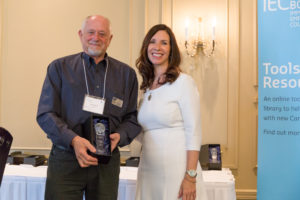 Applied Science Technologists & Technicians of BC, Geoff Sale
Applied Science Technologists & Technicians of BC, Geoff Sale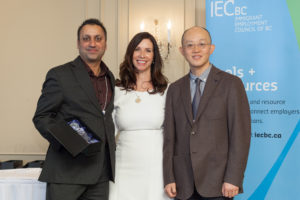 BC Hydro, Raj Sharma and Paul Cheng
BC Hydro, Raj Sharma and Paul Cheng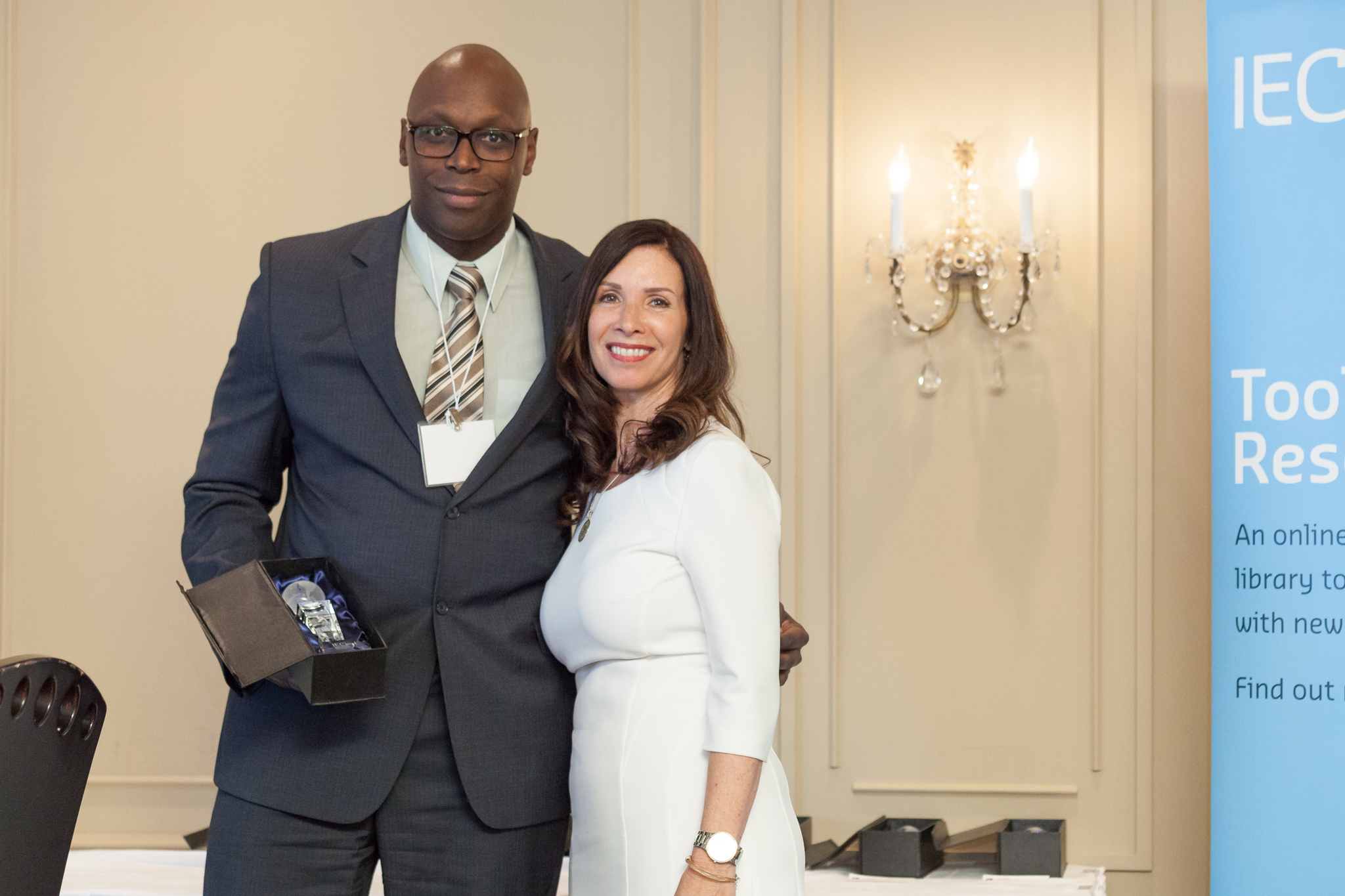 Business Development Bank of Canada, Clyde Roberts
Business Development Bank of Canada, Clyde Roberts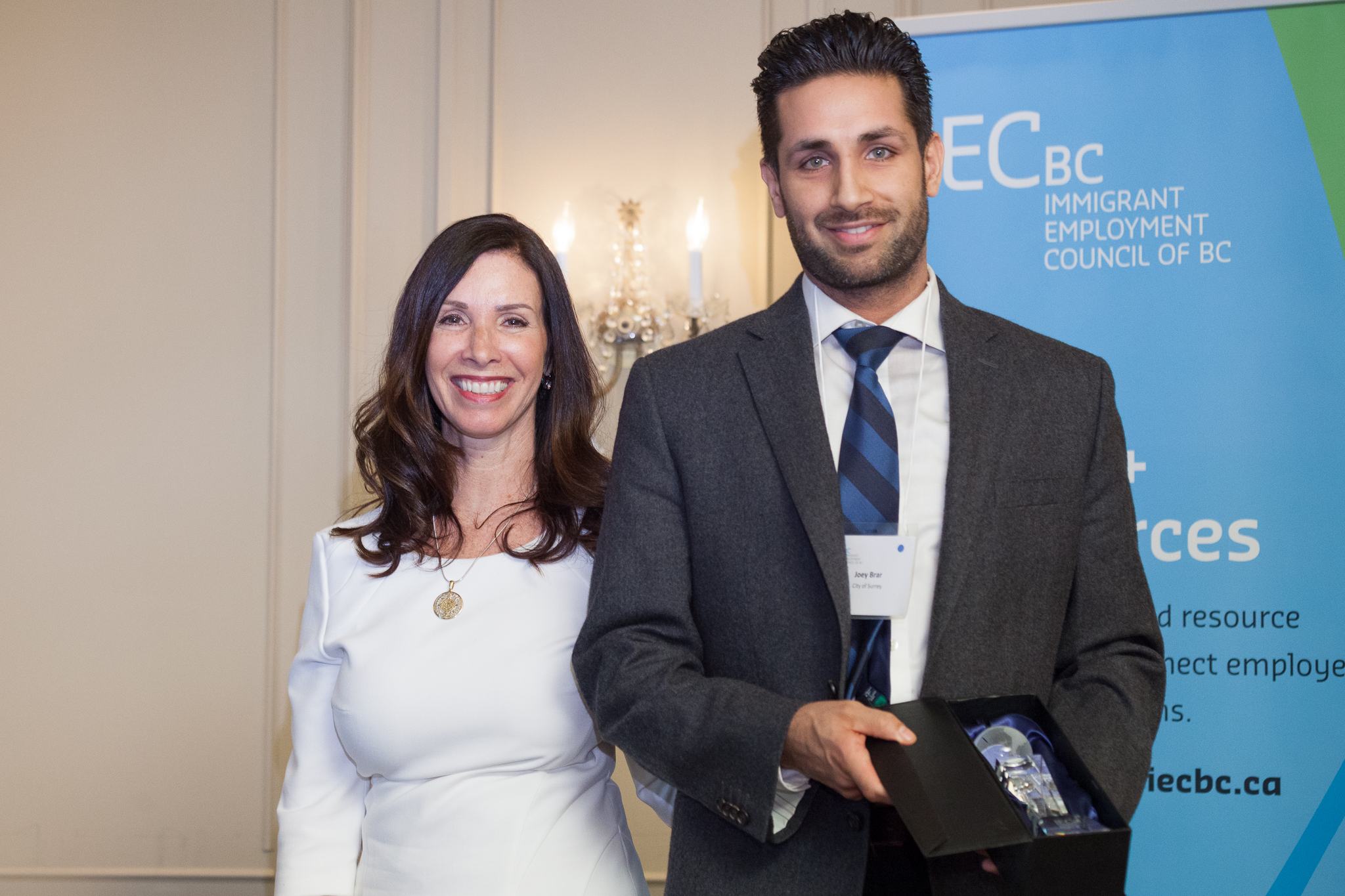 City of Surrey, Joey Brar
City of Surrey, Joey Brar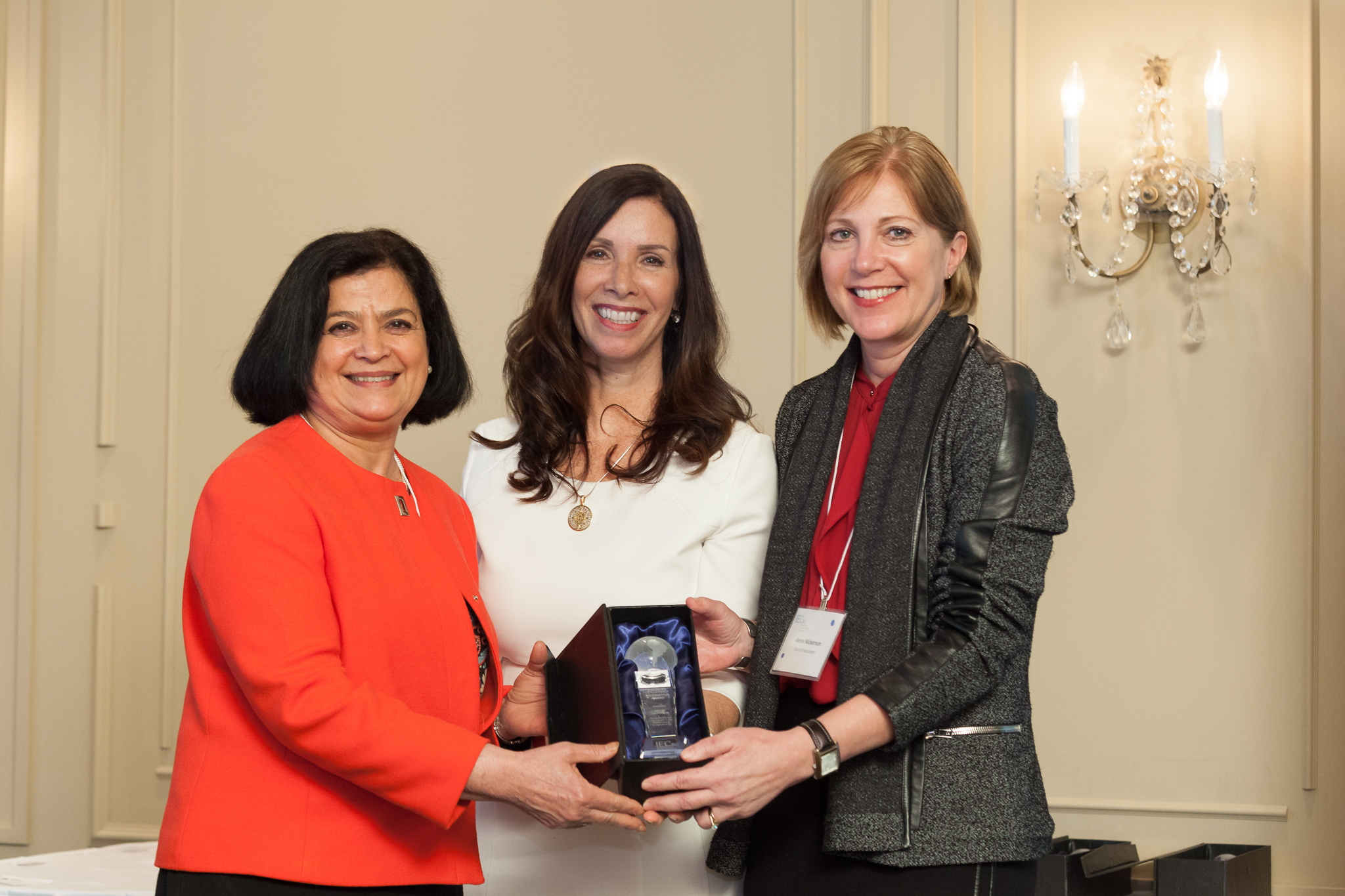 City of Vancouver, Anne Nickerson and Rajpal Kohli
City of Vancouver, Anne Nickerson and Rajpal Kohli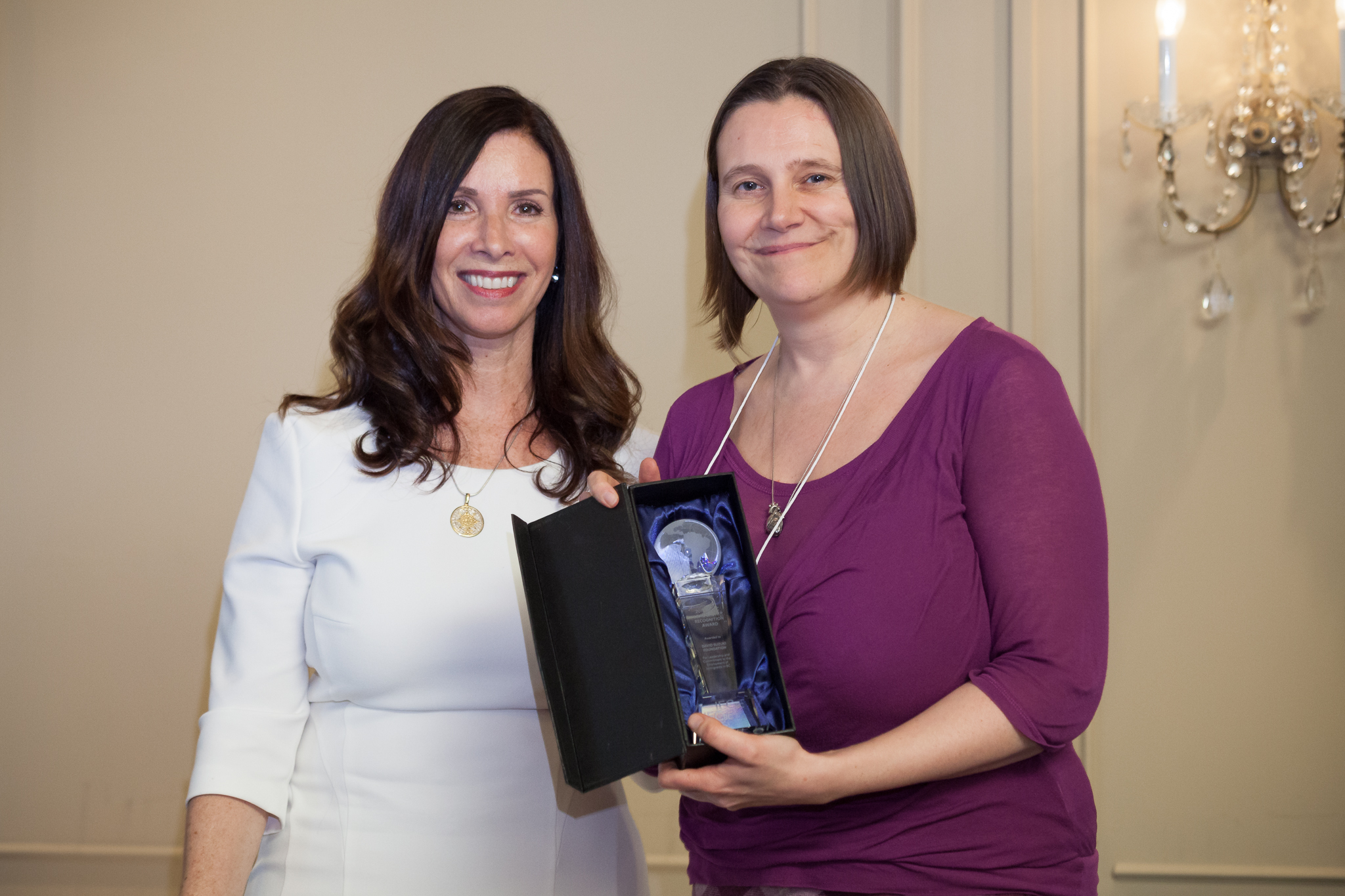 David Suzuki Foundation, Catherine Gordon
David Suzuki Foundation, Catherine Gordon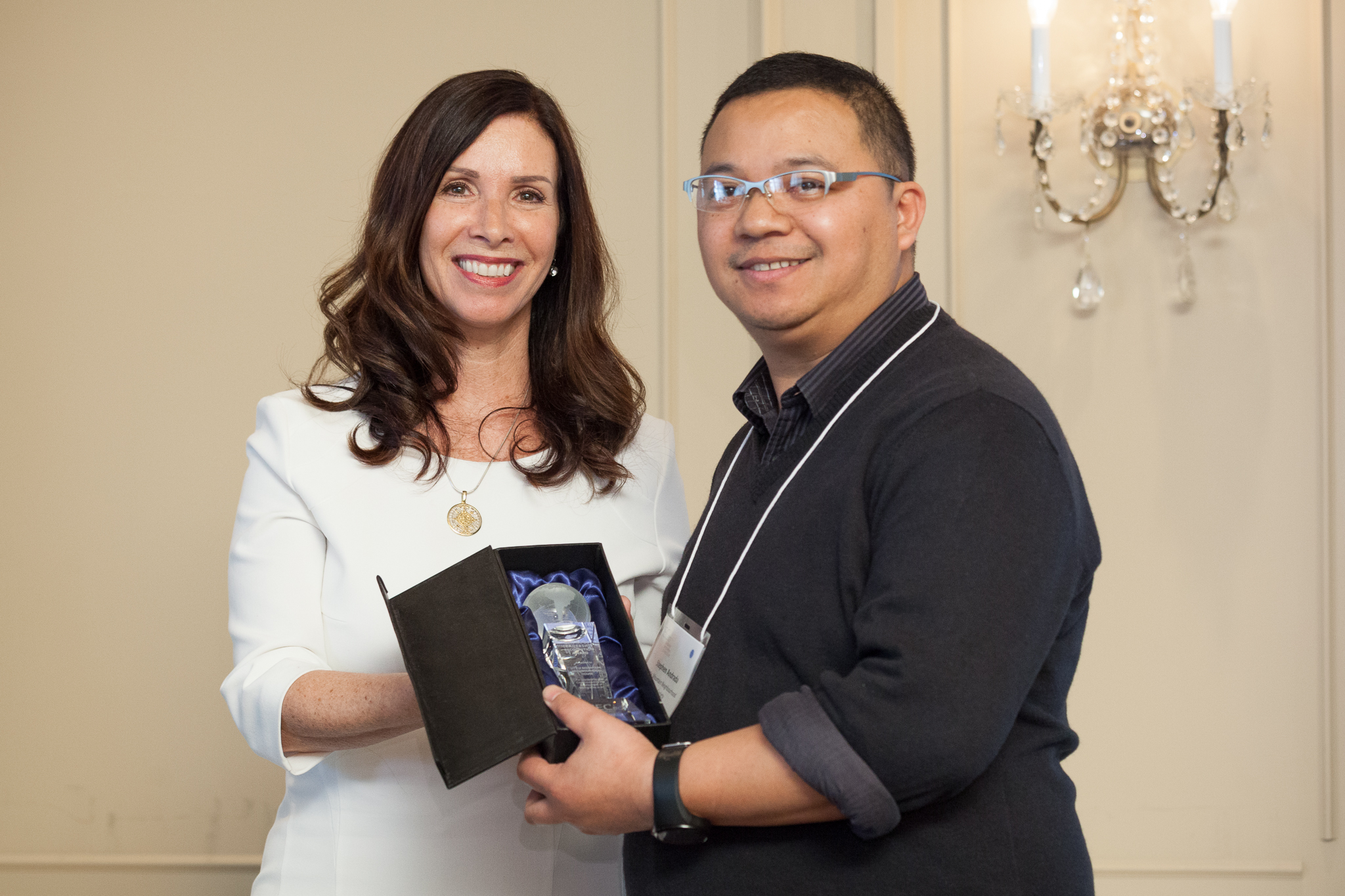 Little Mountain Neighbourhood House, Stephen Andrada
Little Mountain Neighbourhood House, Stephen Andrada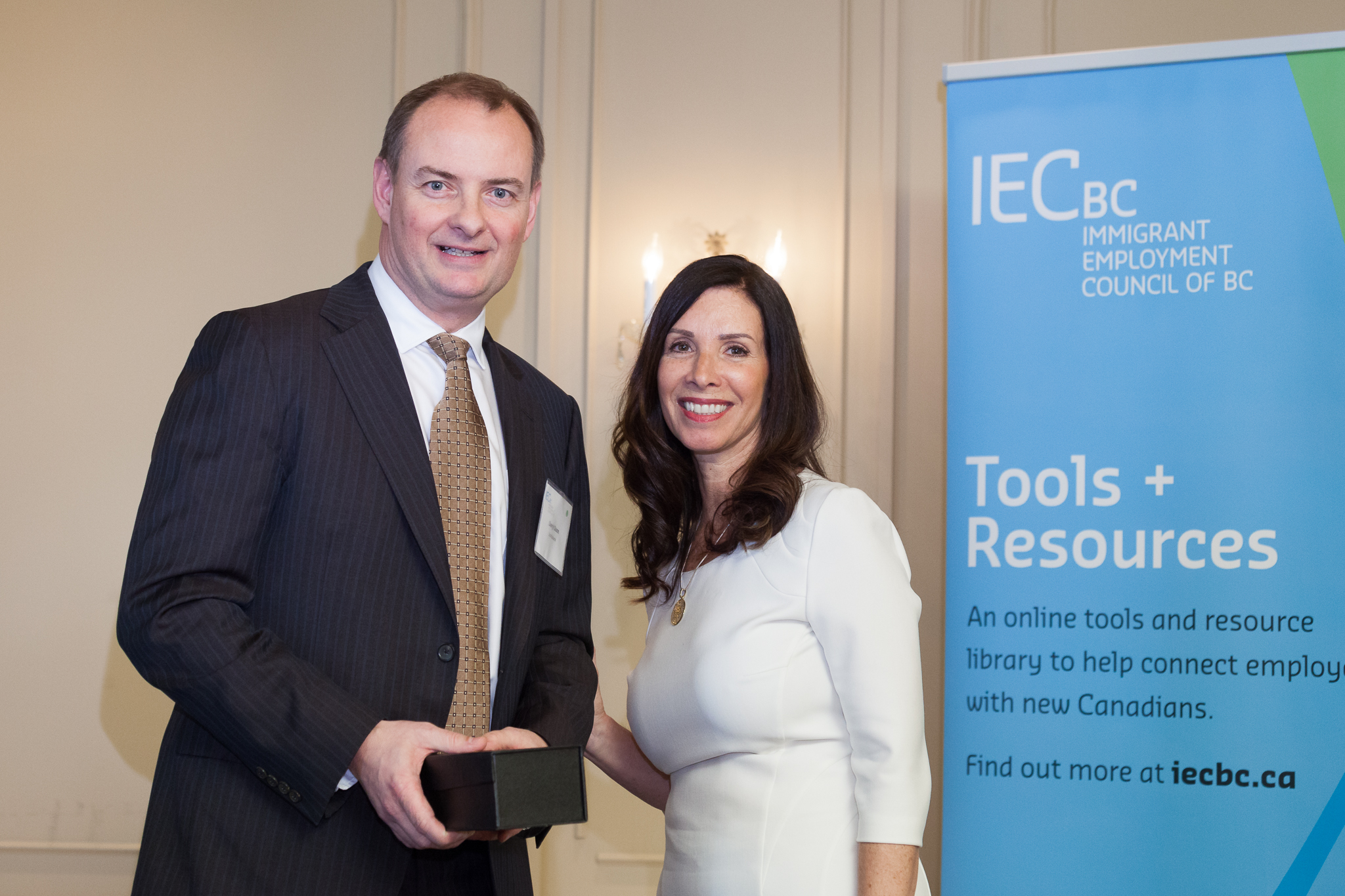 Scotiabank, Daryl Dunn
Scotiabank, Daryl Dunn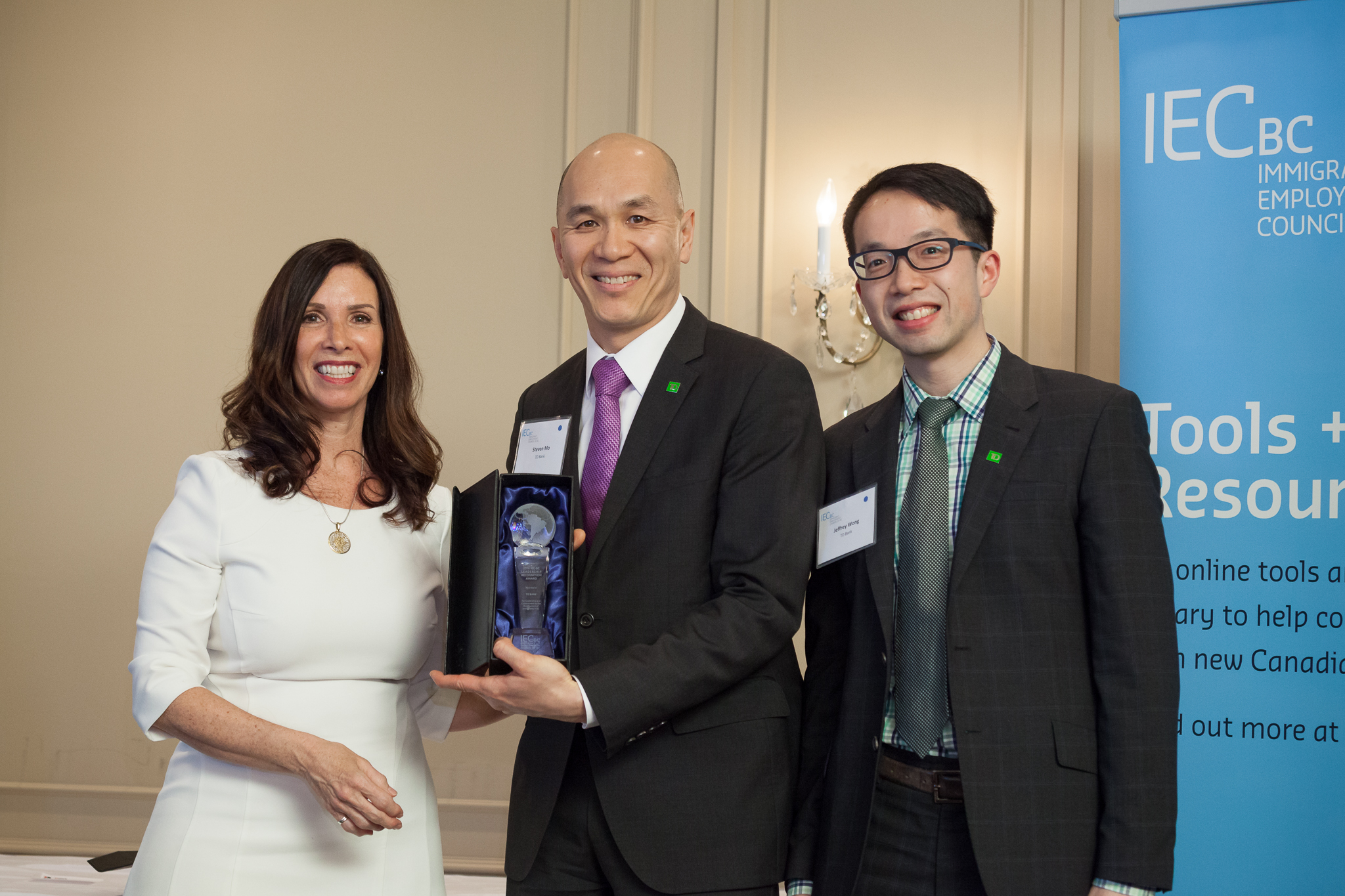 TD Bank, Jeffrey Wong and Steven Mo
TD Bank, Jeffrey Wong and Steven Mo TELUS, Hannah Kim and Tapiwa Chibota
TELUS, Hannah Kim and Tapiwa Chibota











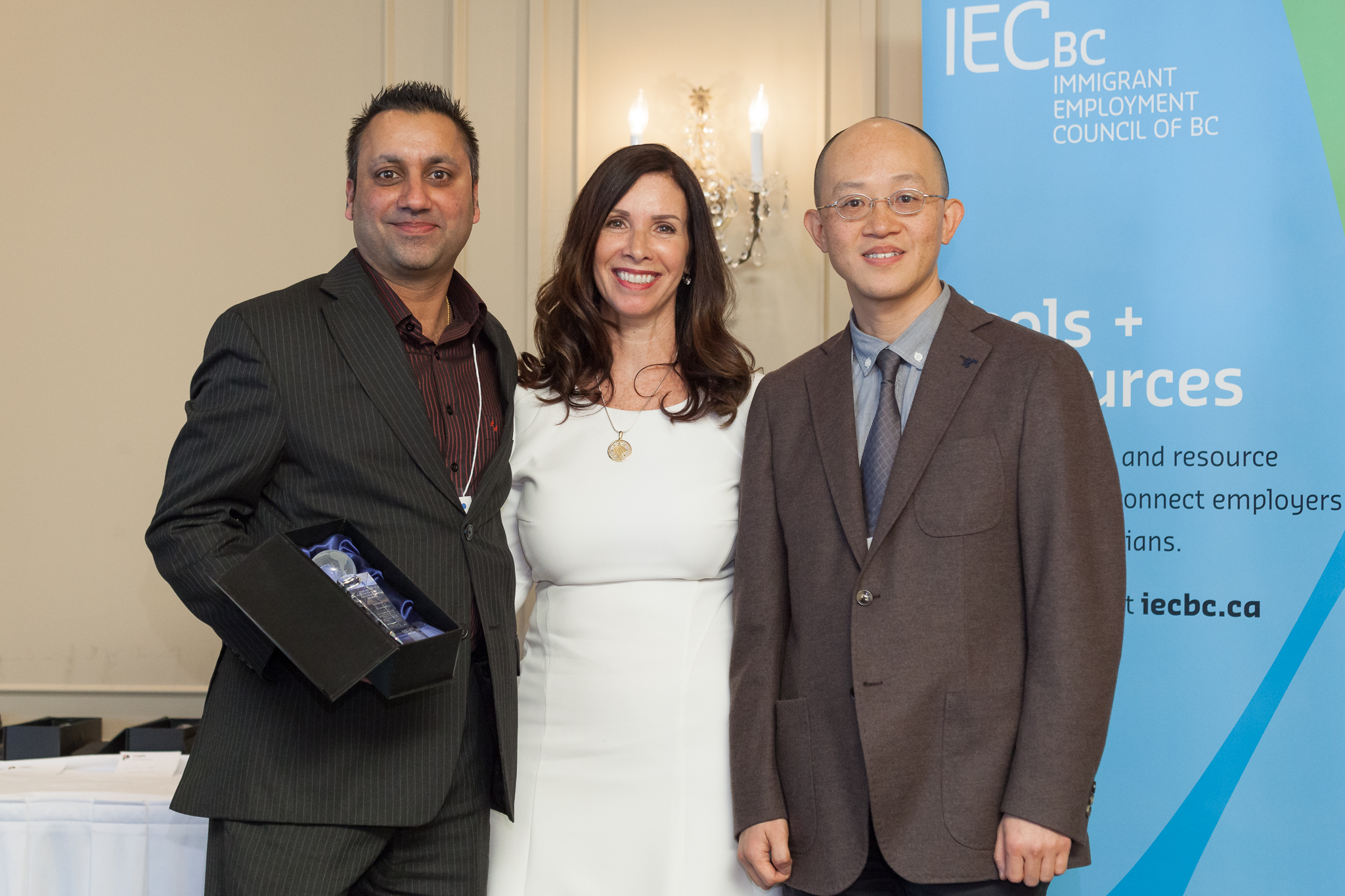
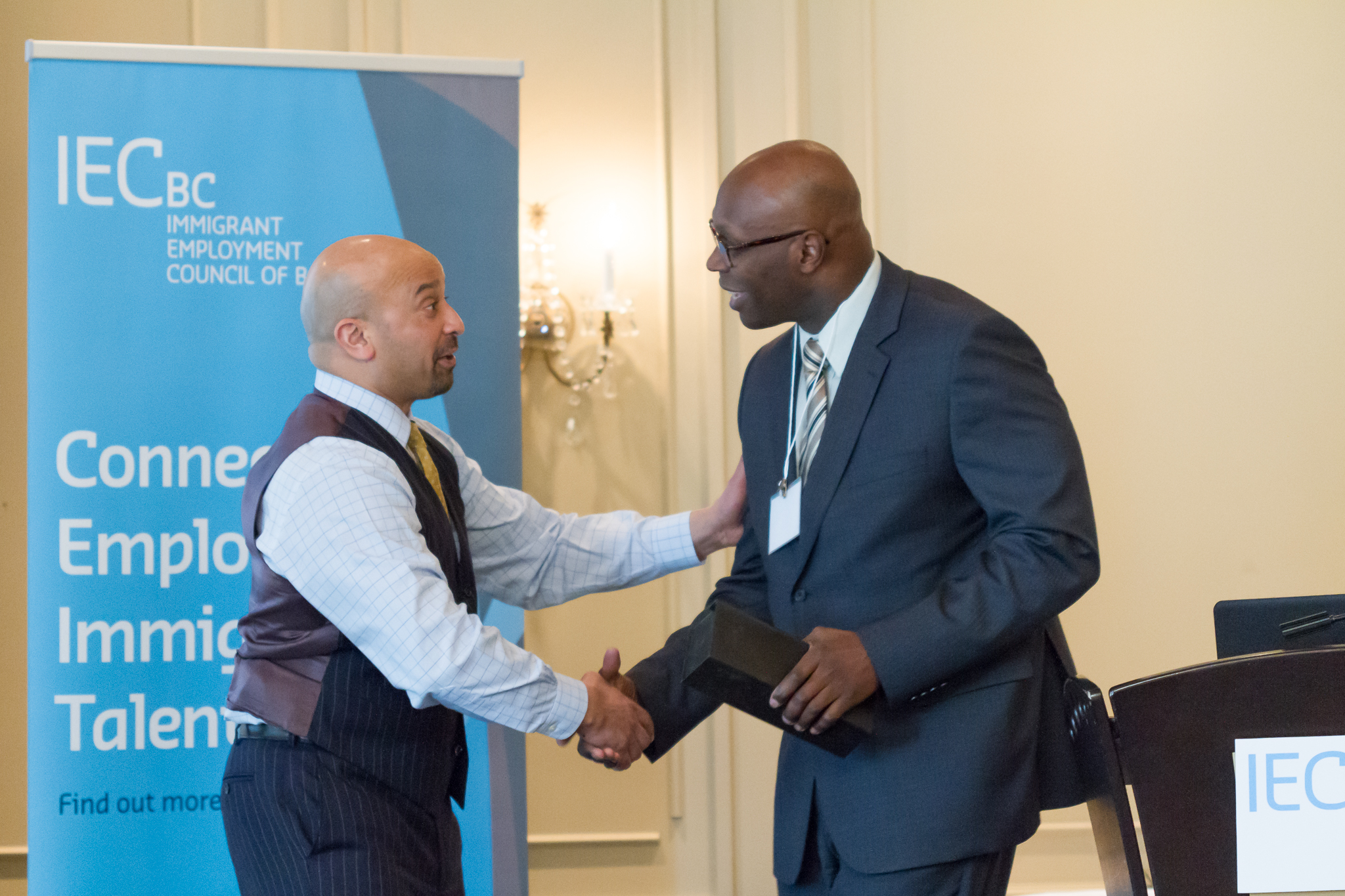






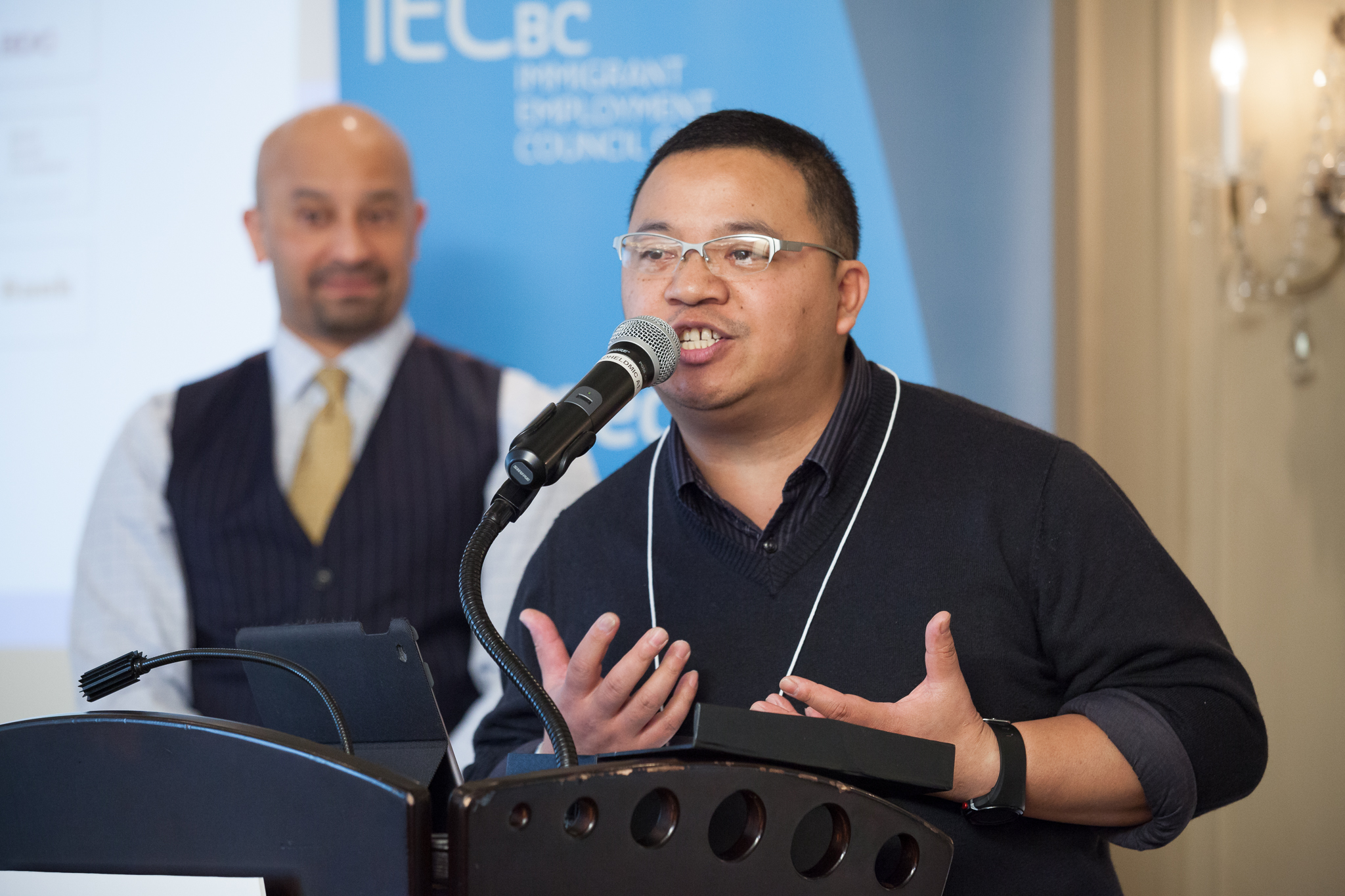





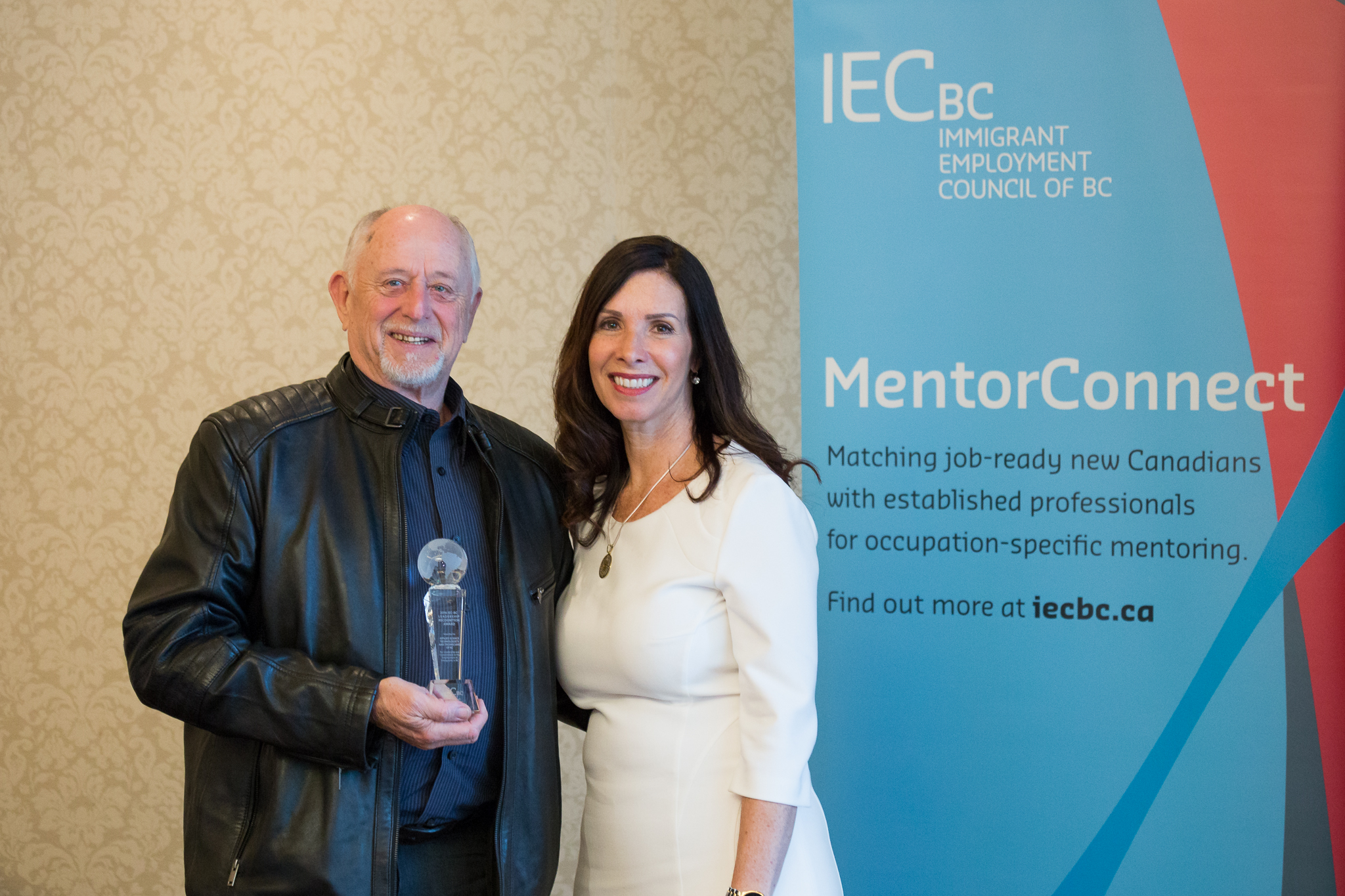



 City of Vancouver
City of Vancouver Telus
Telus Applied Science Technologists & Technicians of BC
Applied Science Technologists & Technicians of BC BC Construction Association
BC Construction Association Campbell River and District Chamber of Commerce
Campbell River and District Chamber of Commerce Human Resources Management Association
Human Resources Management Association Filipino Canadian Construction Society & Iranian Engineers of BC Association
Filipino Canadian Construction Society & Iranian Engineers of BC Association